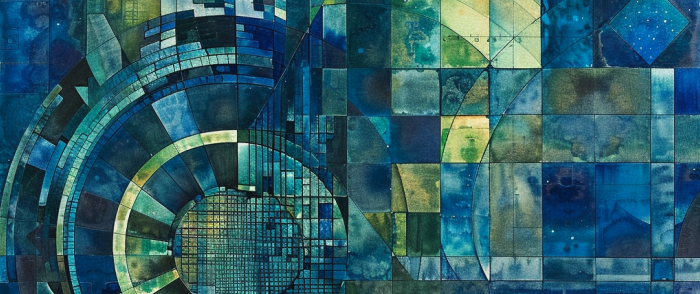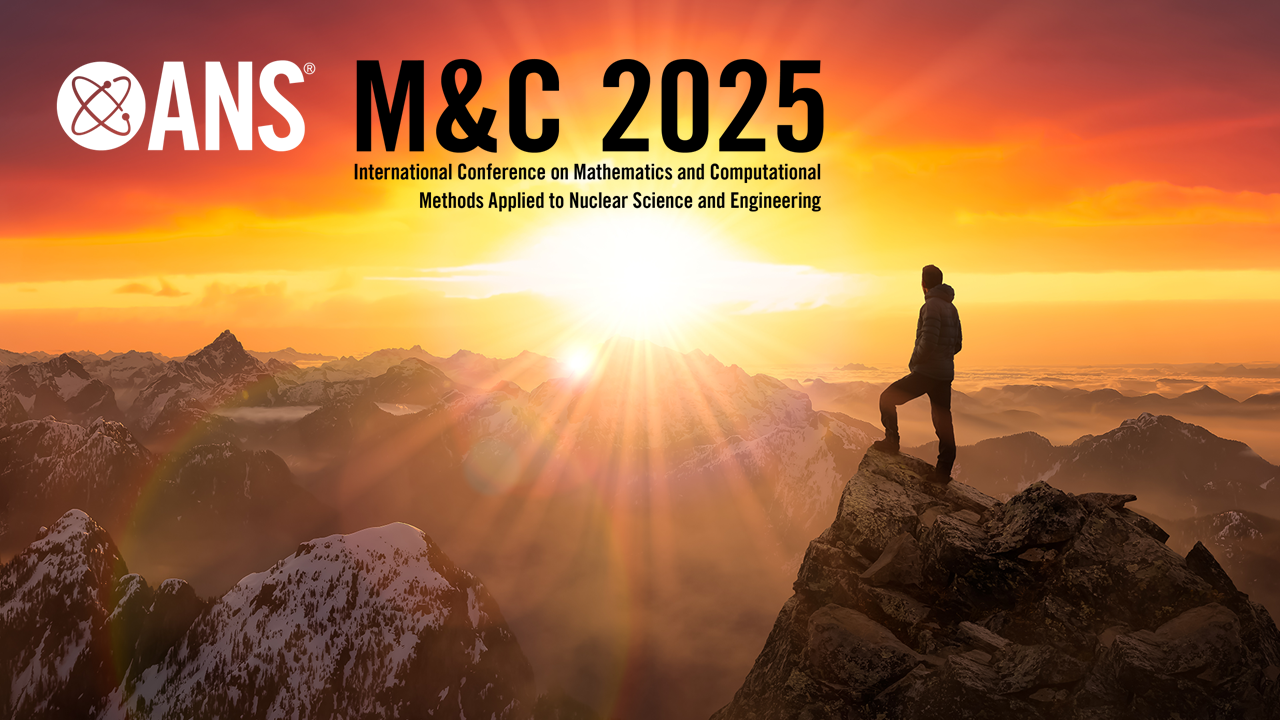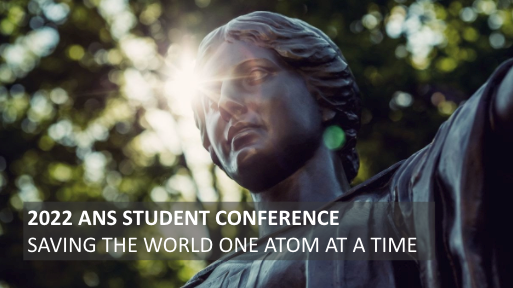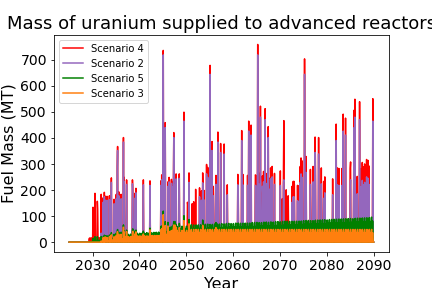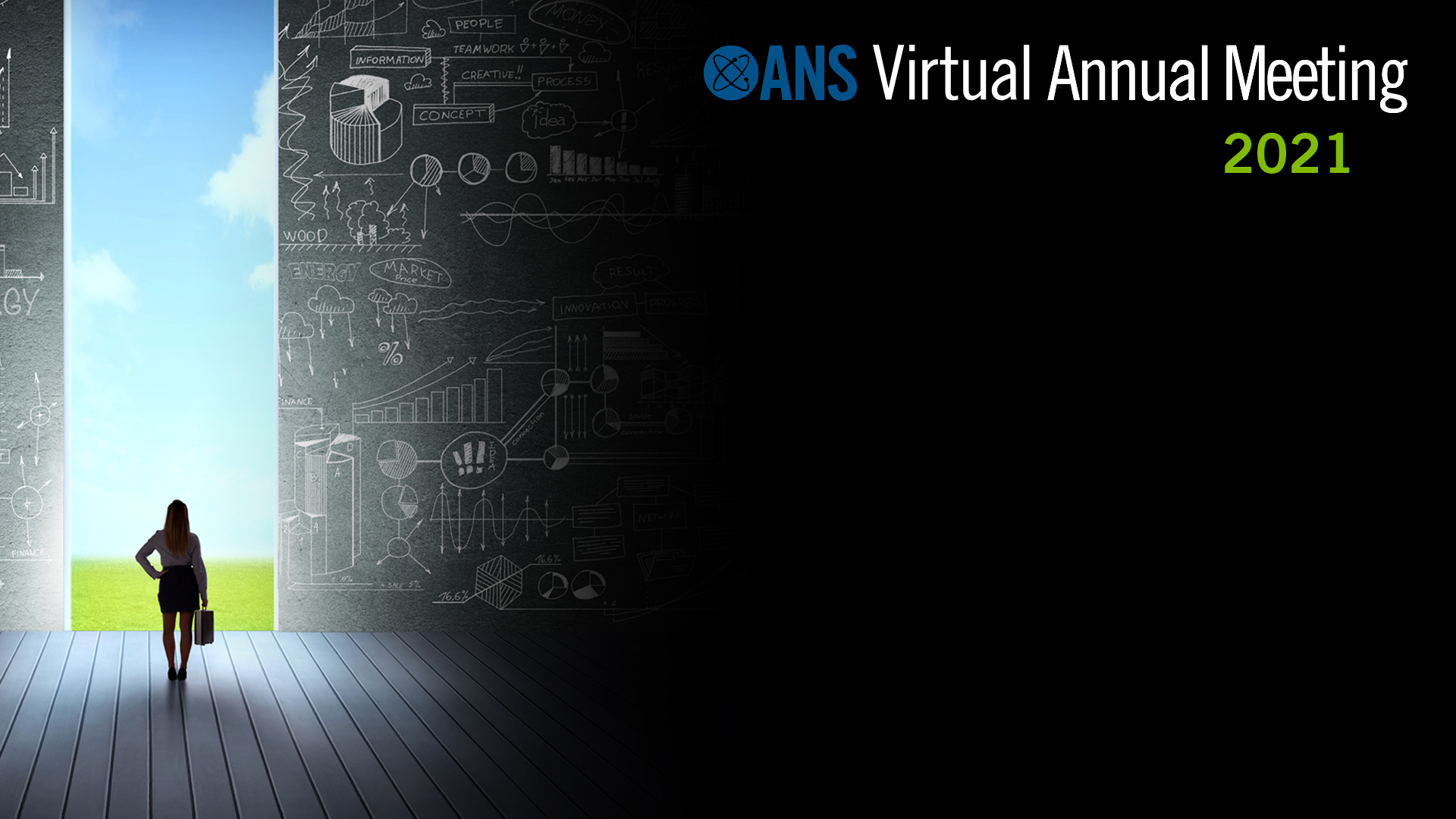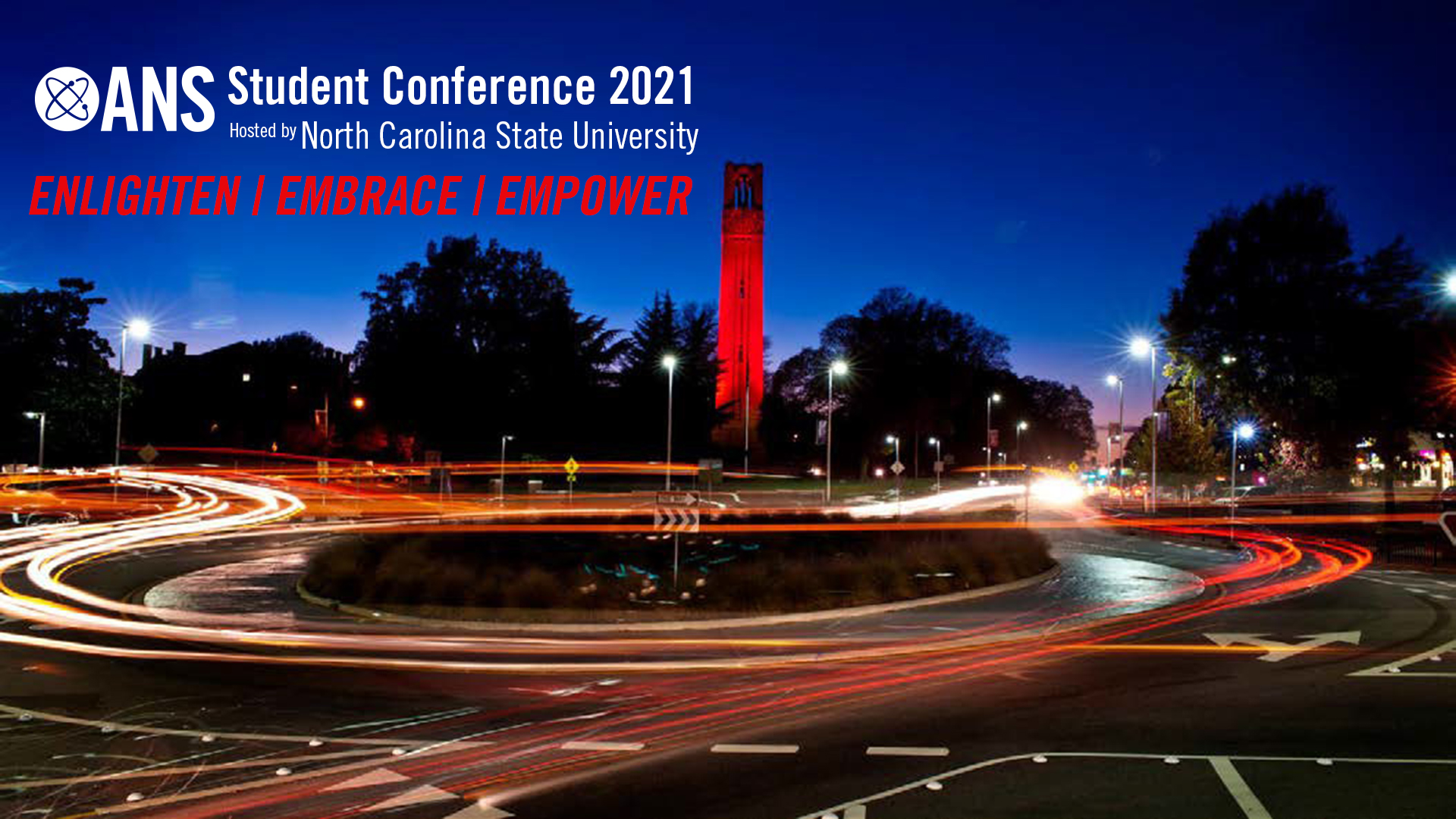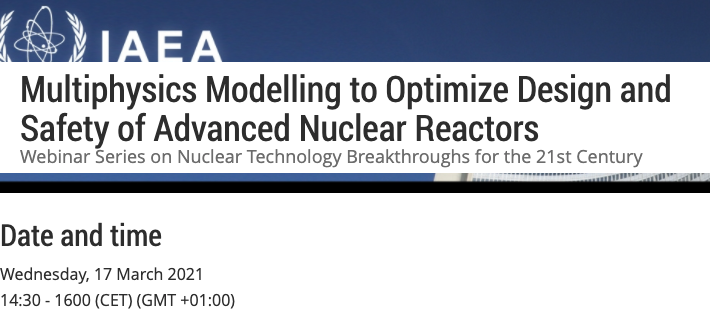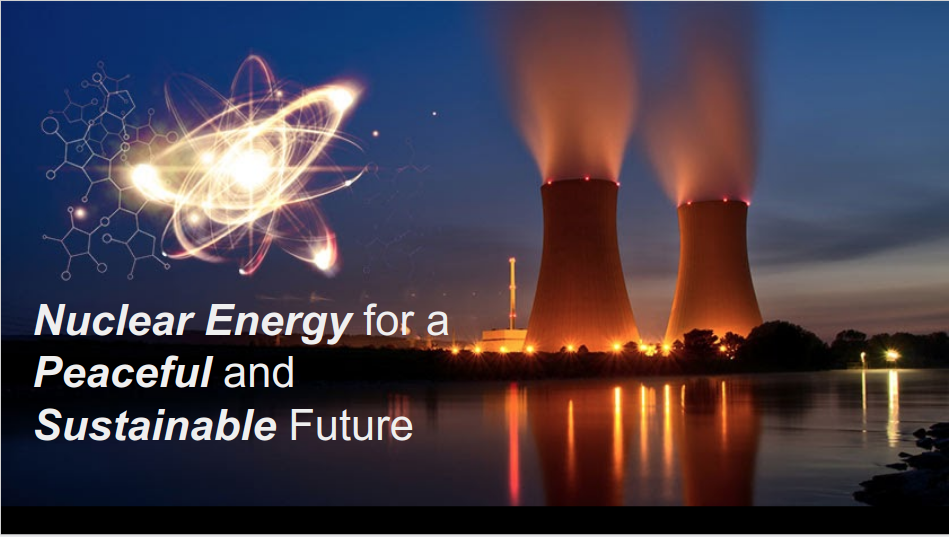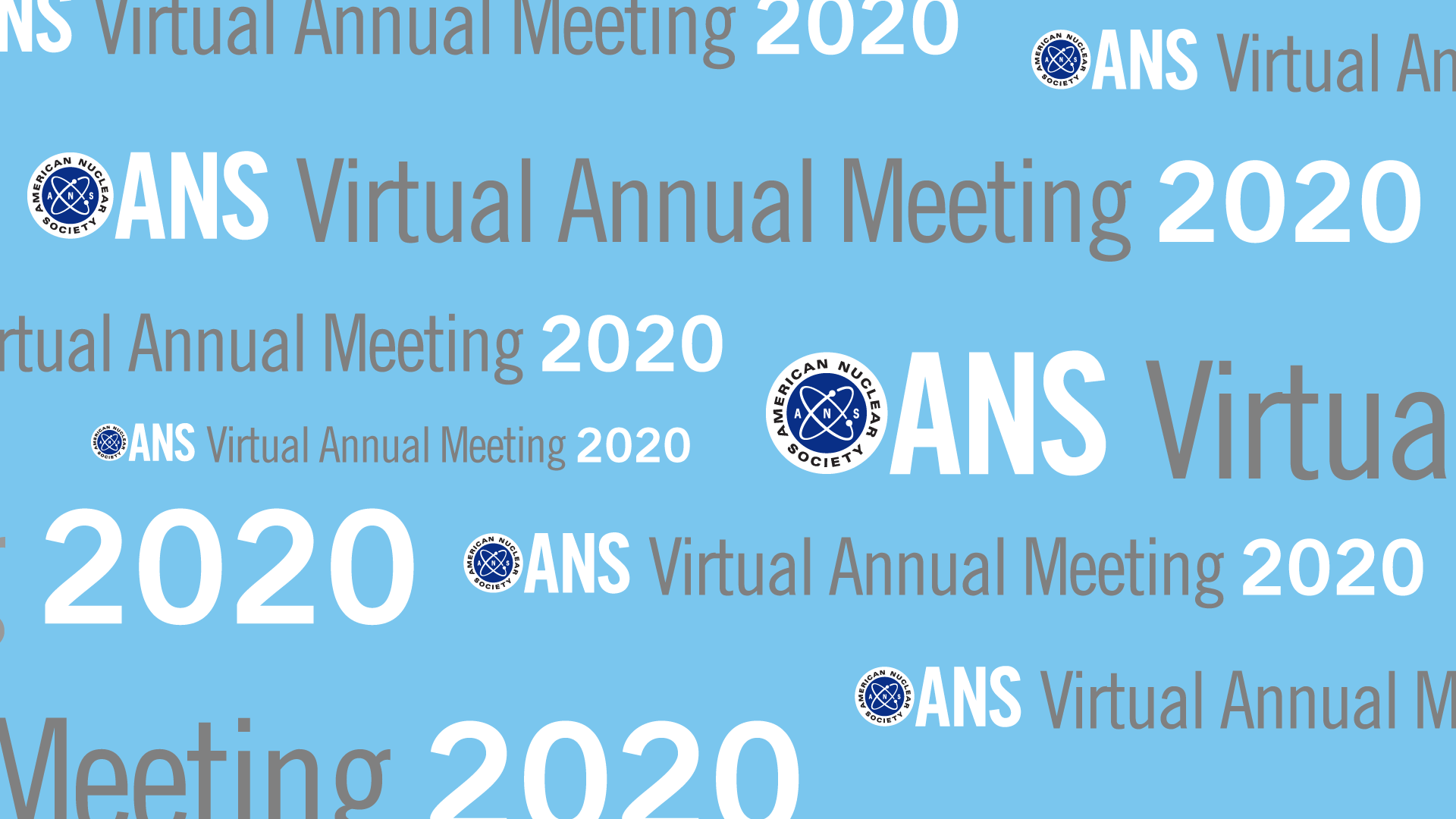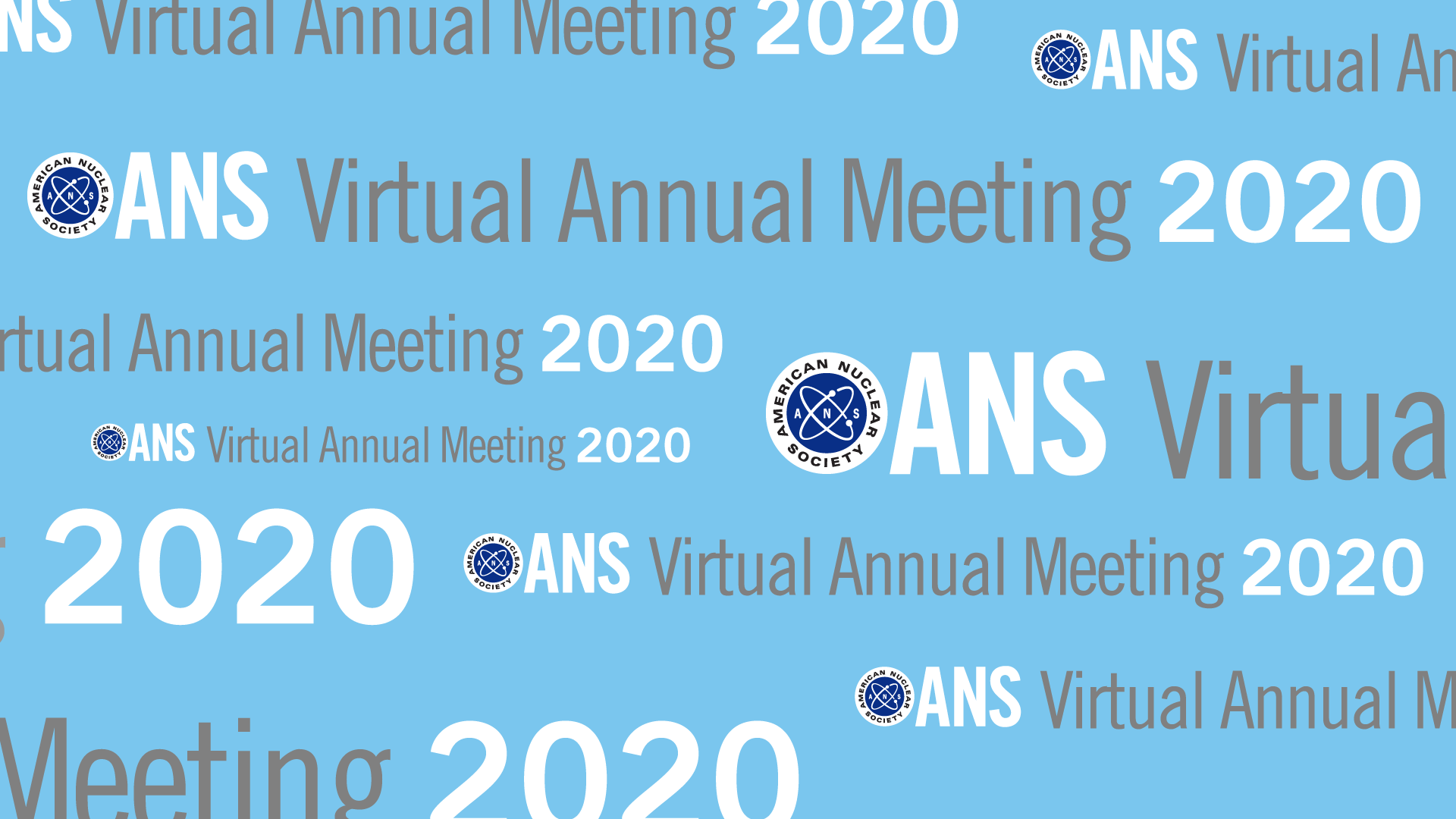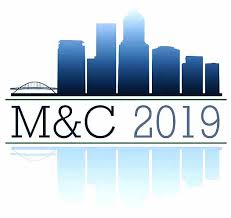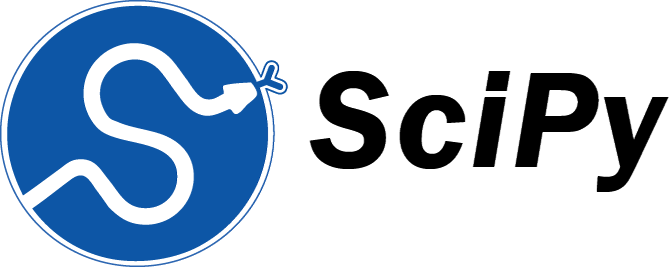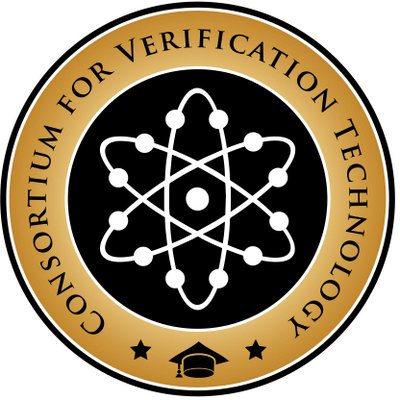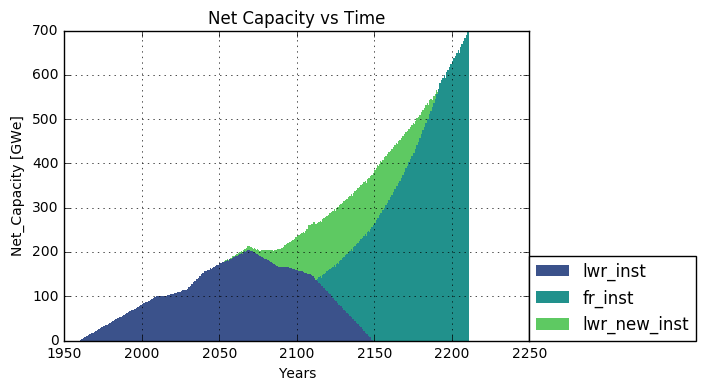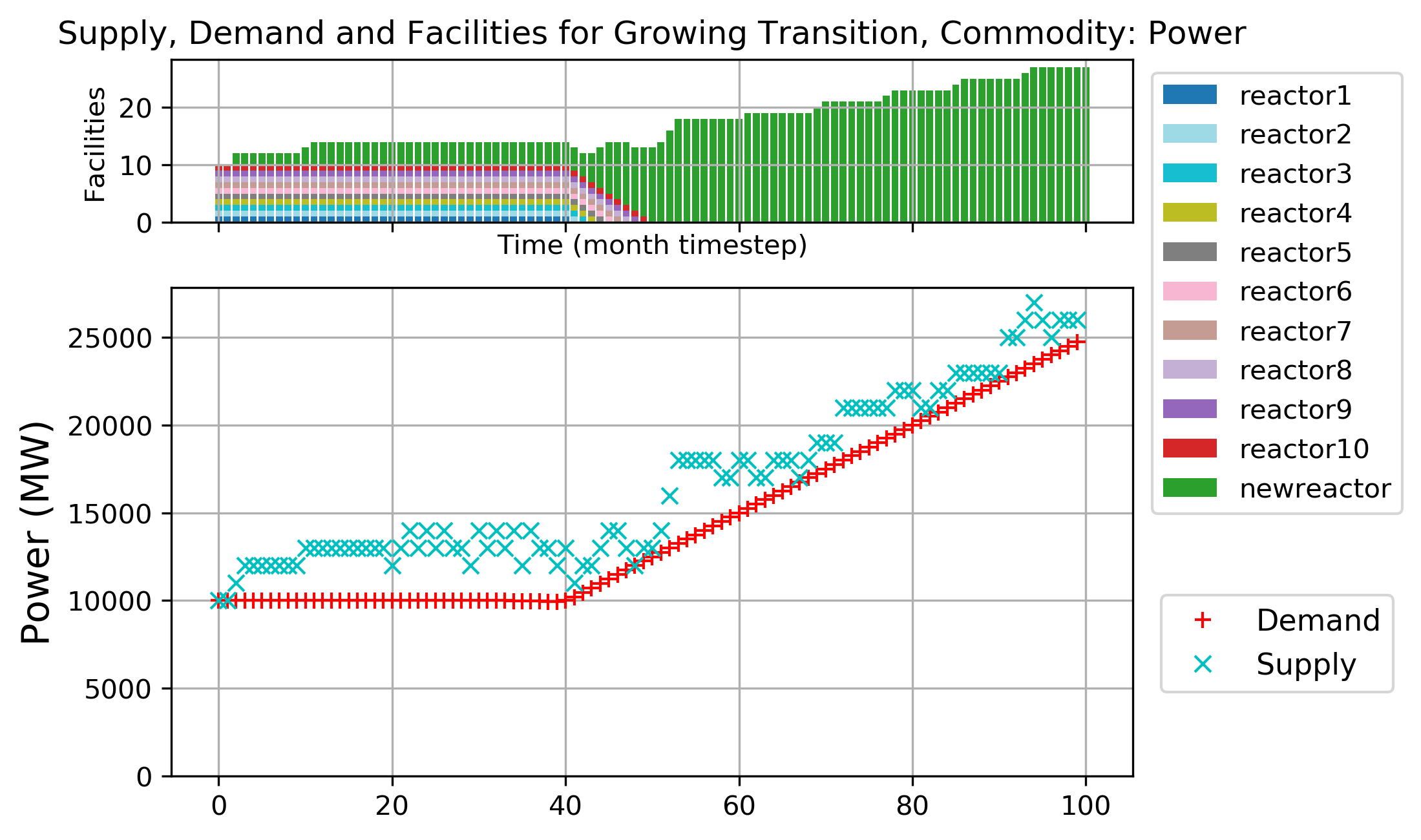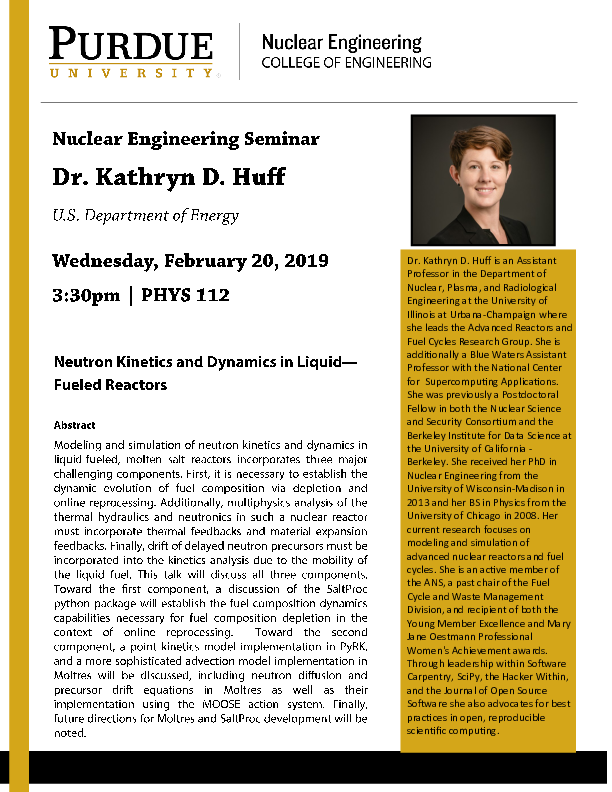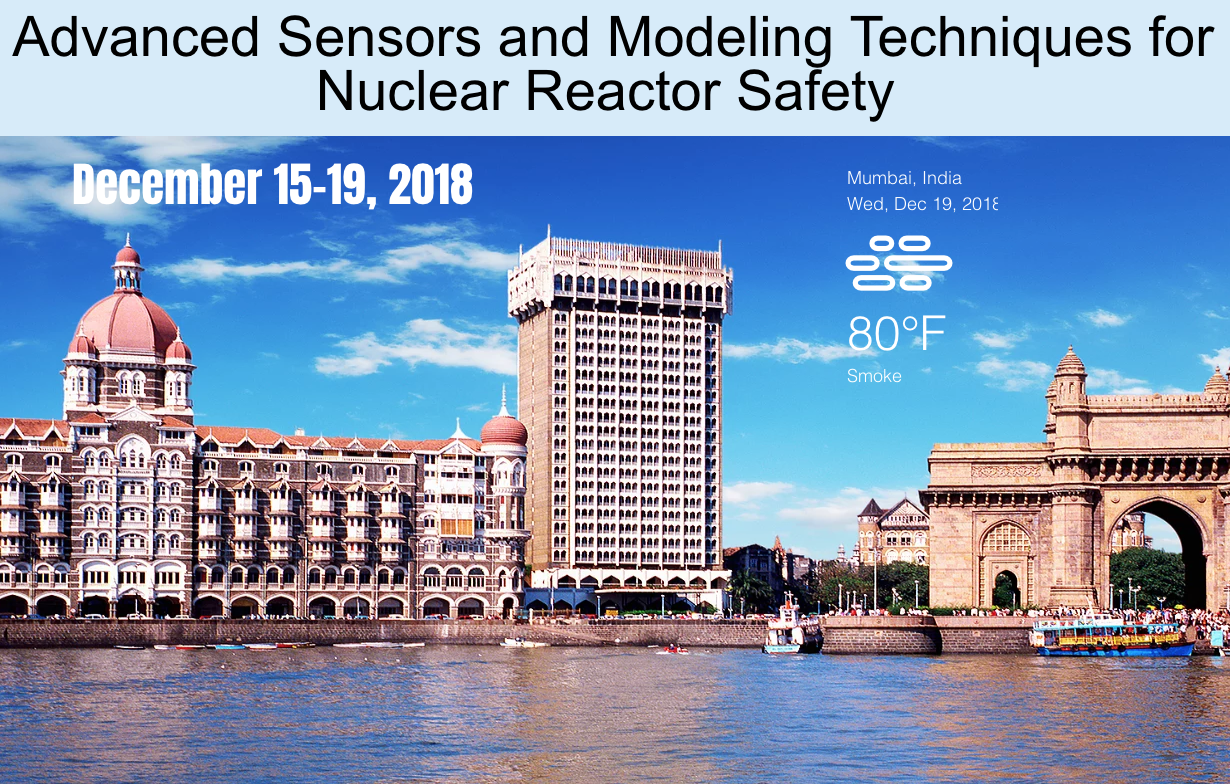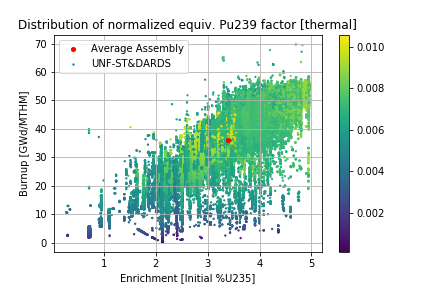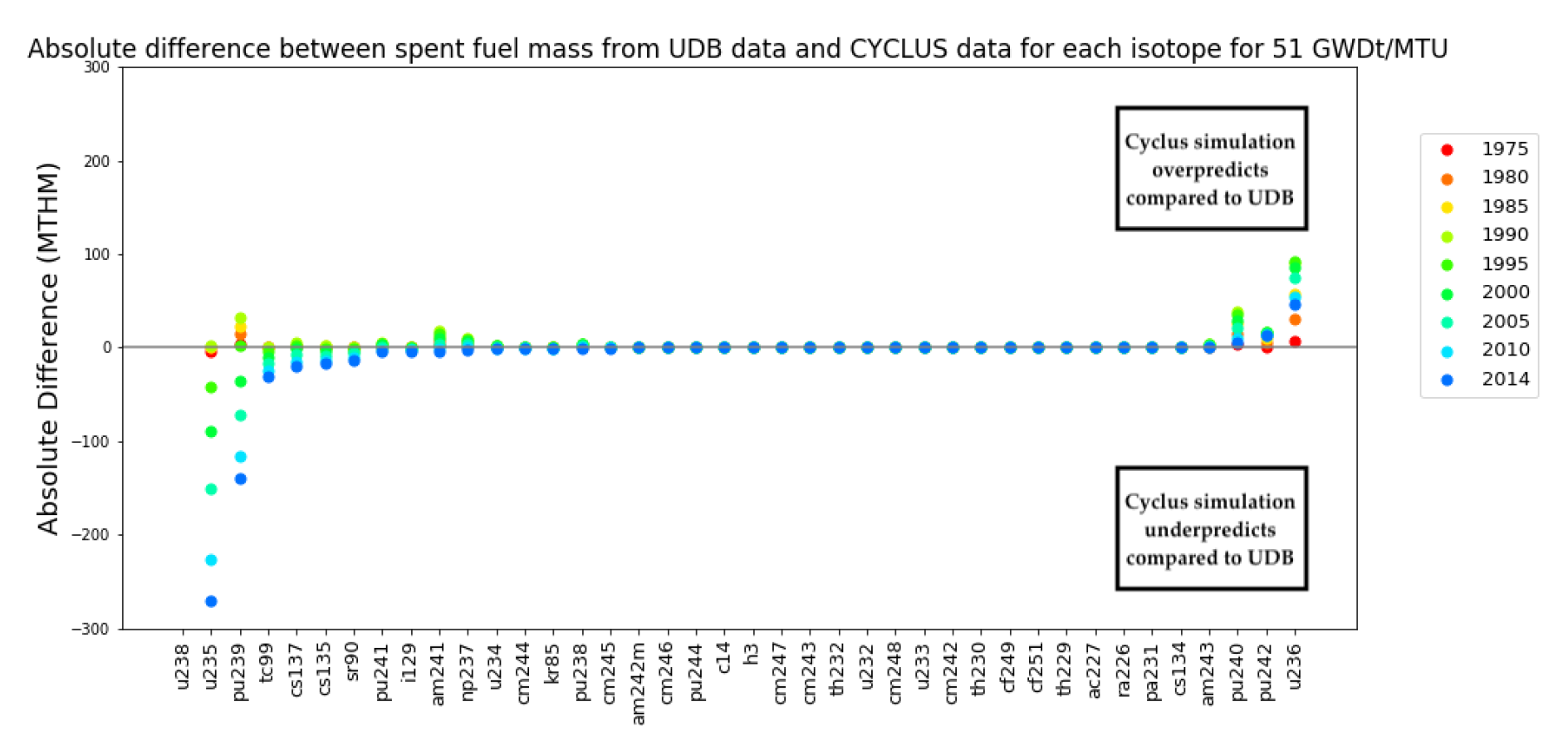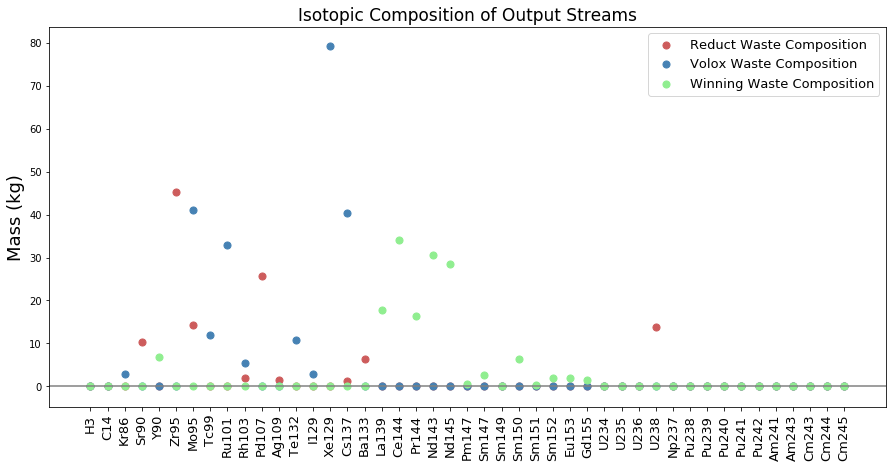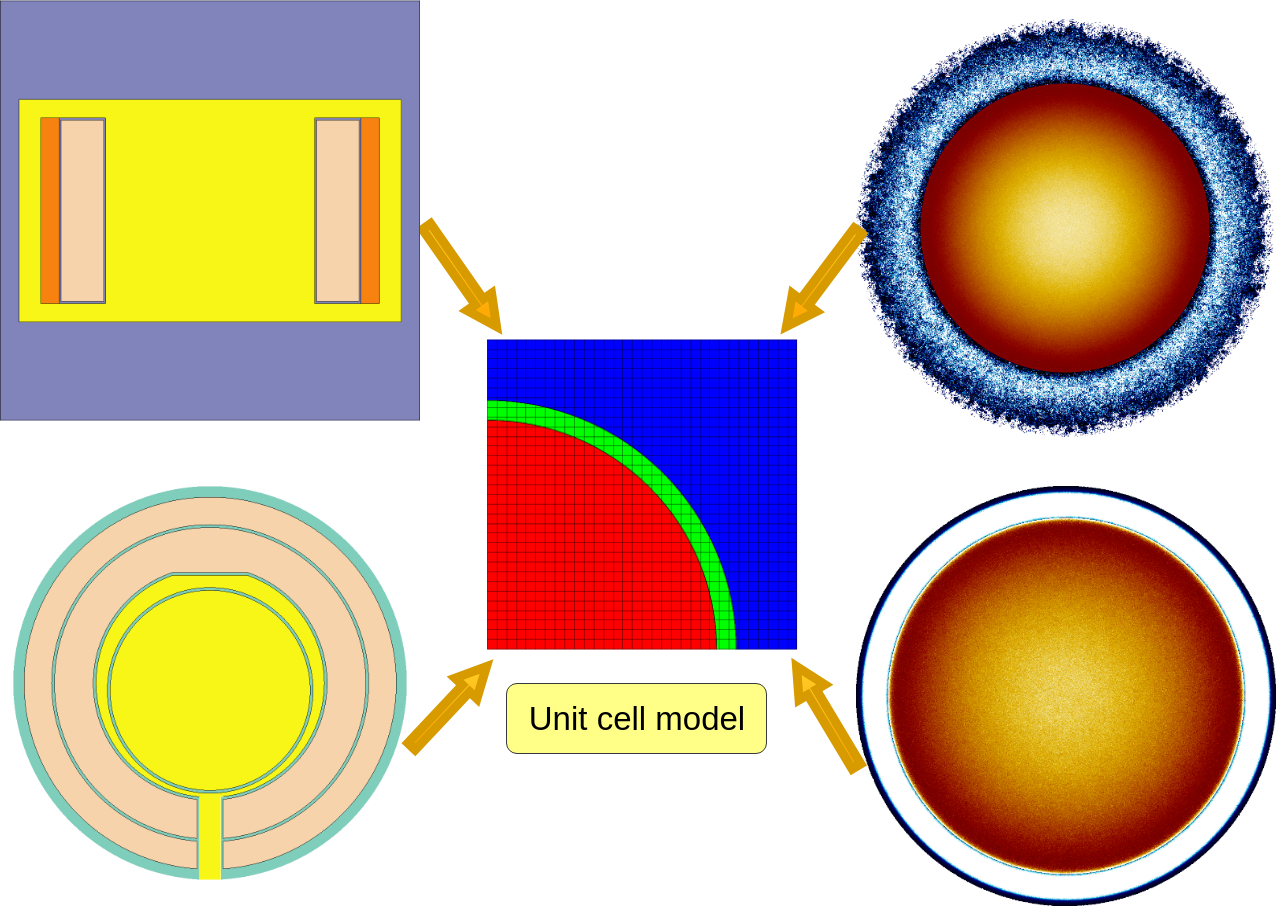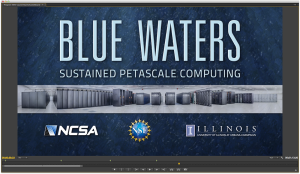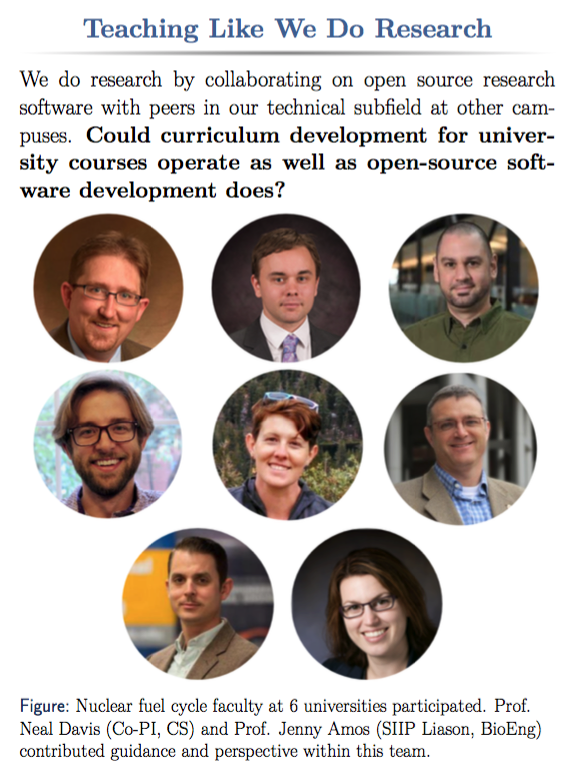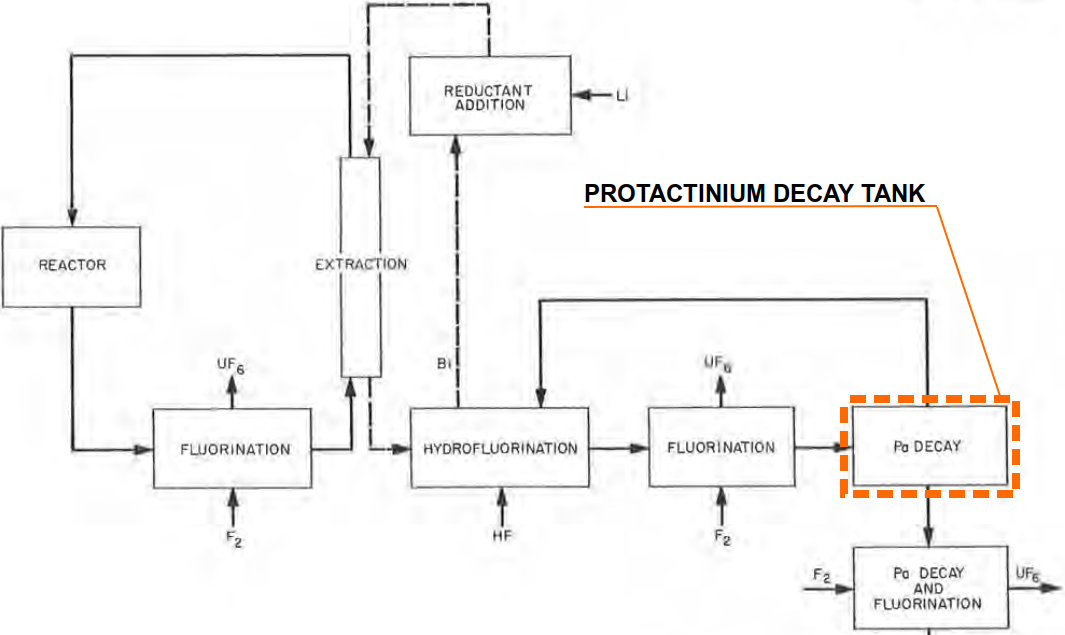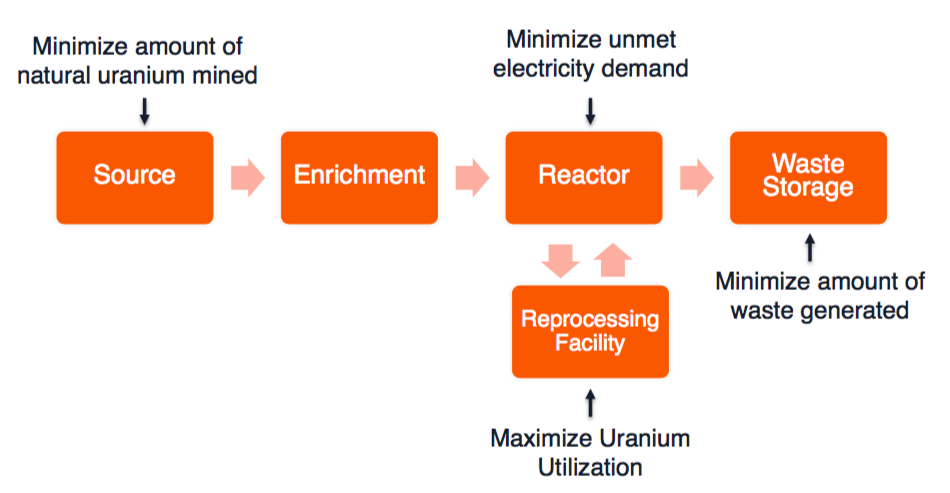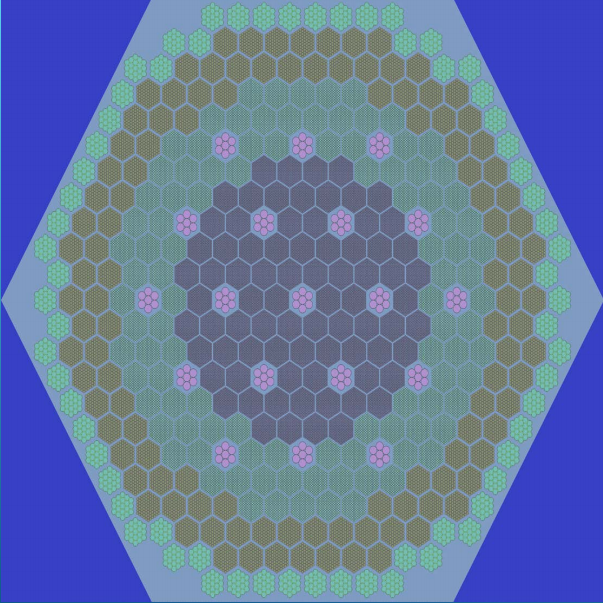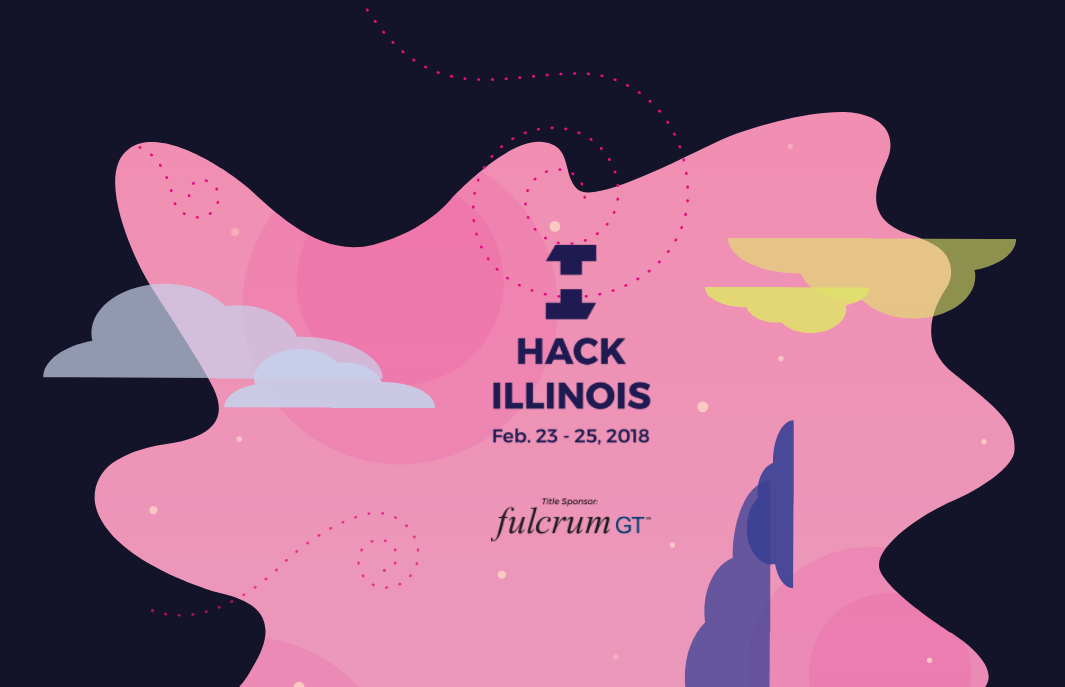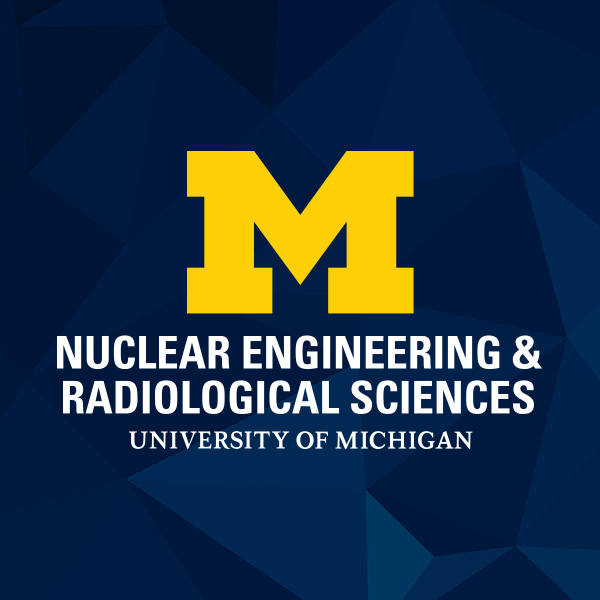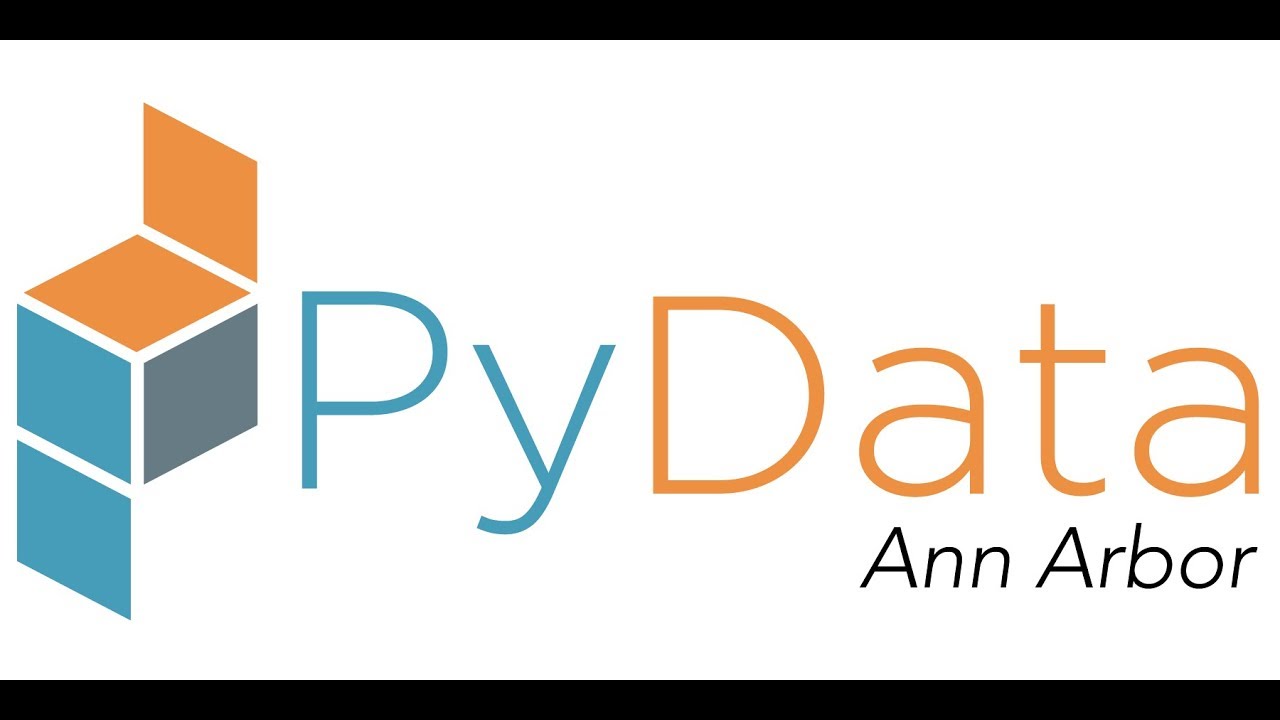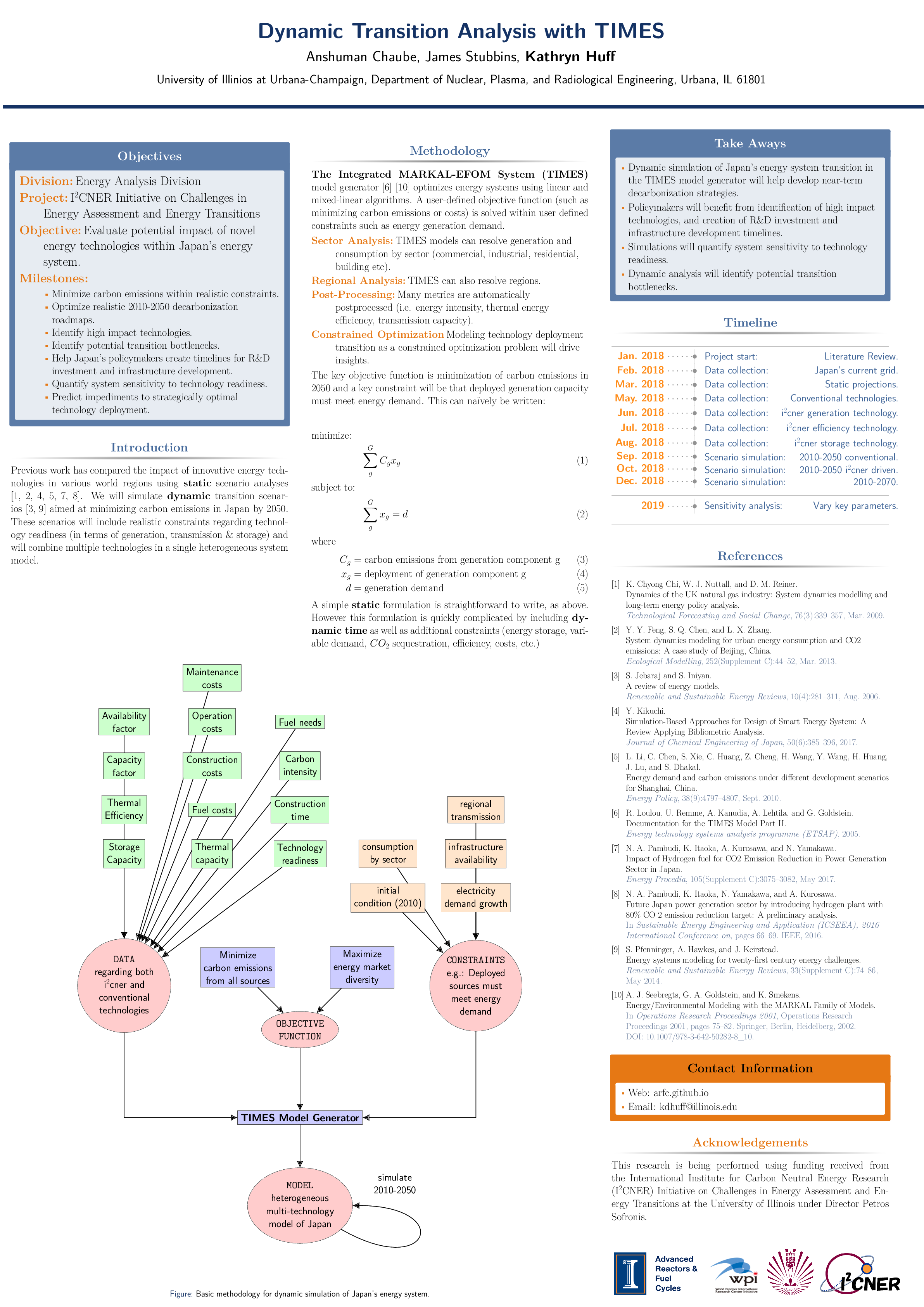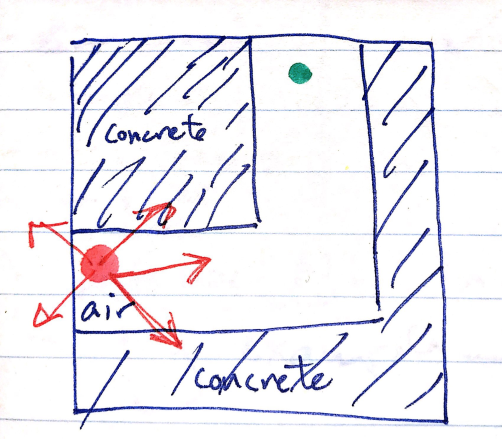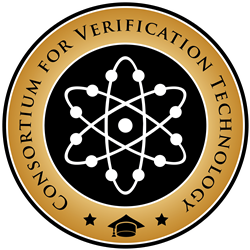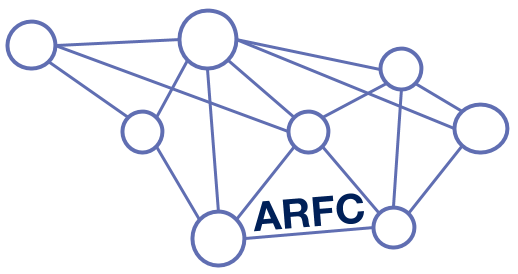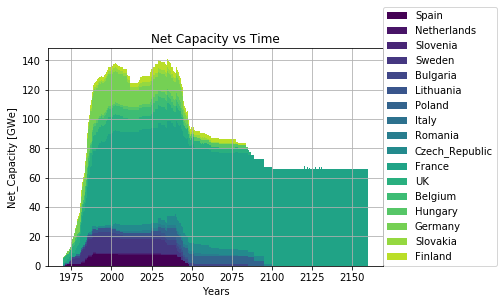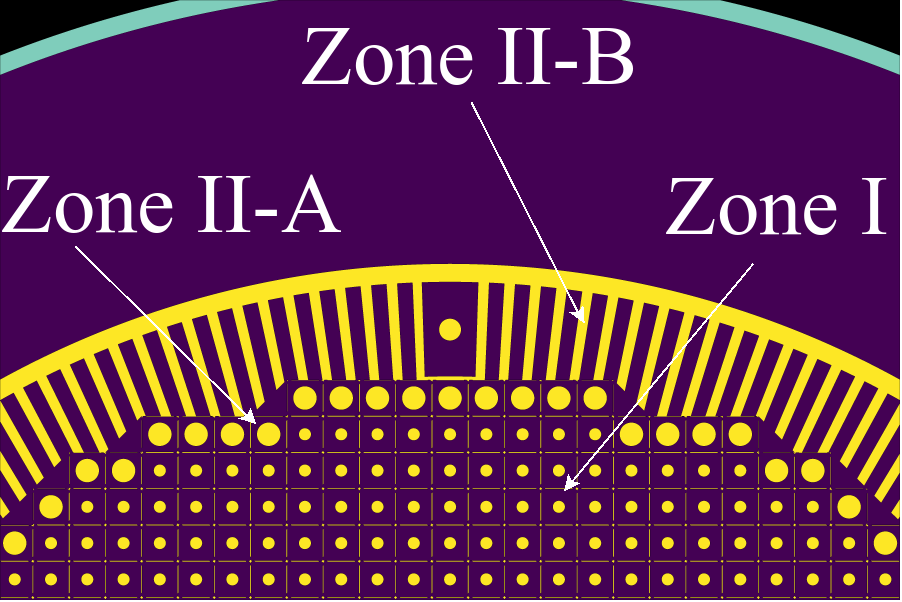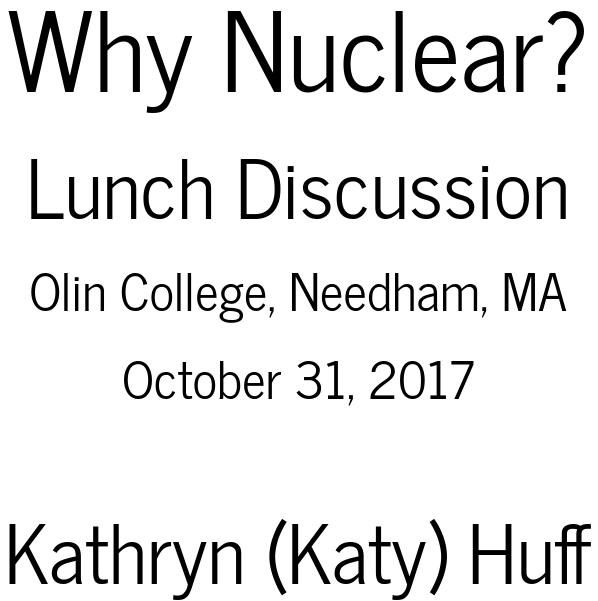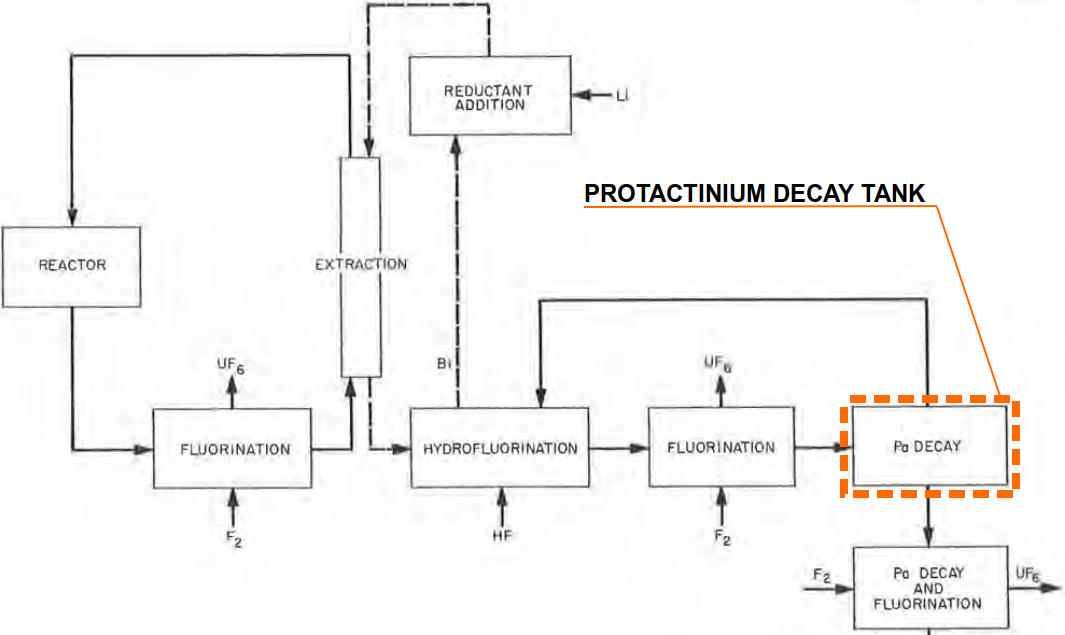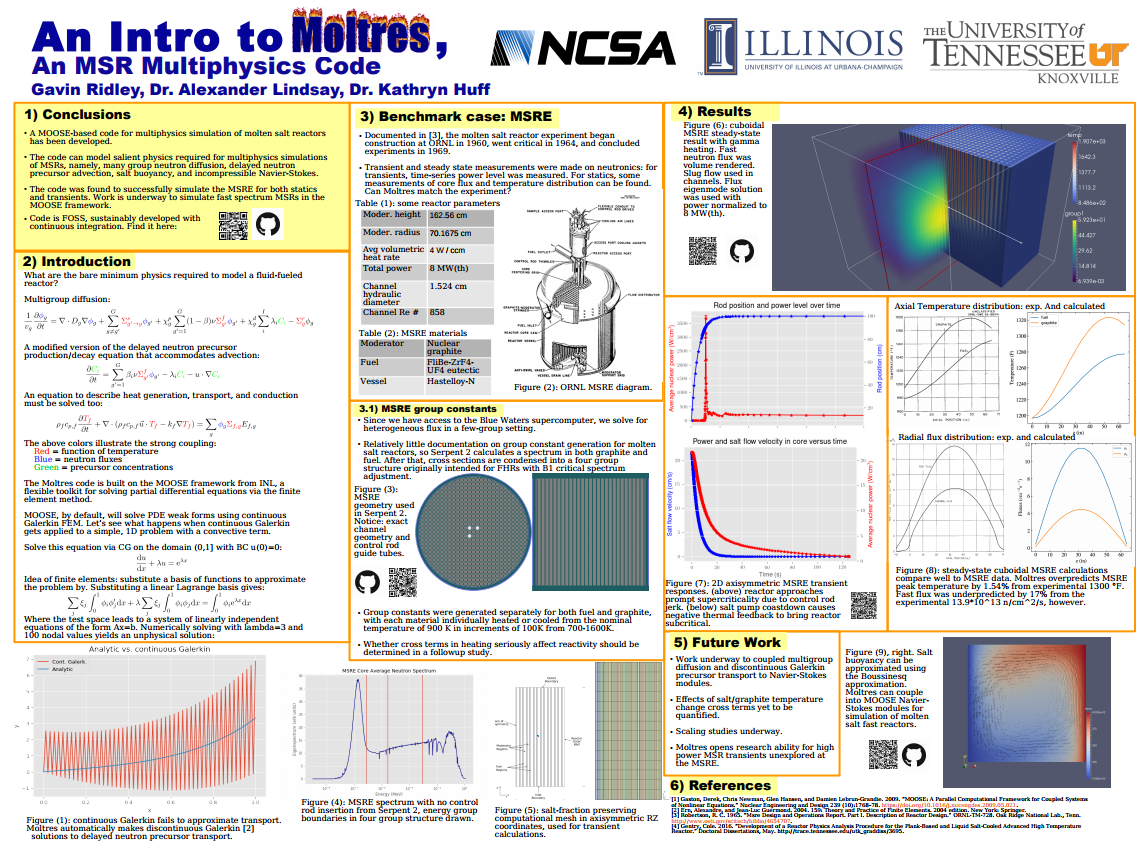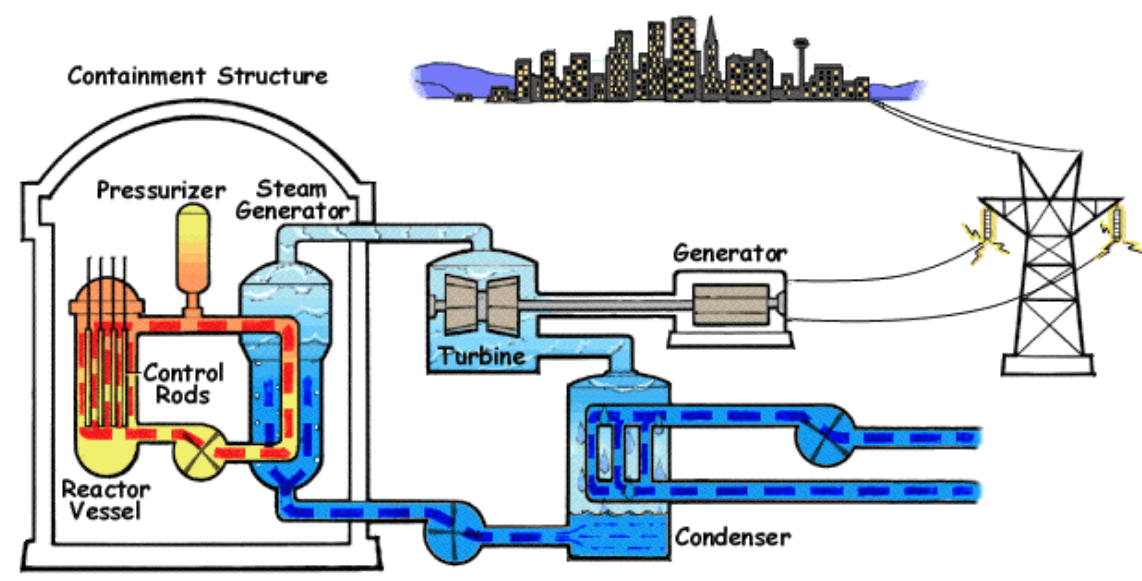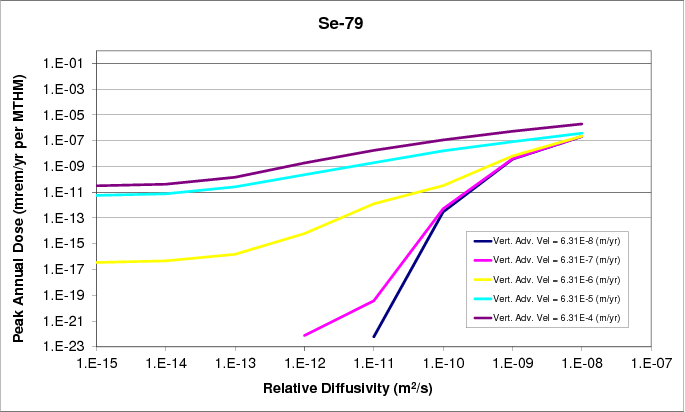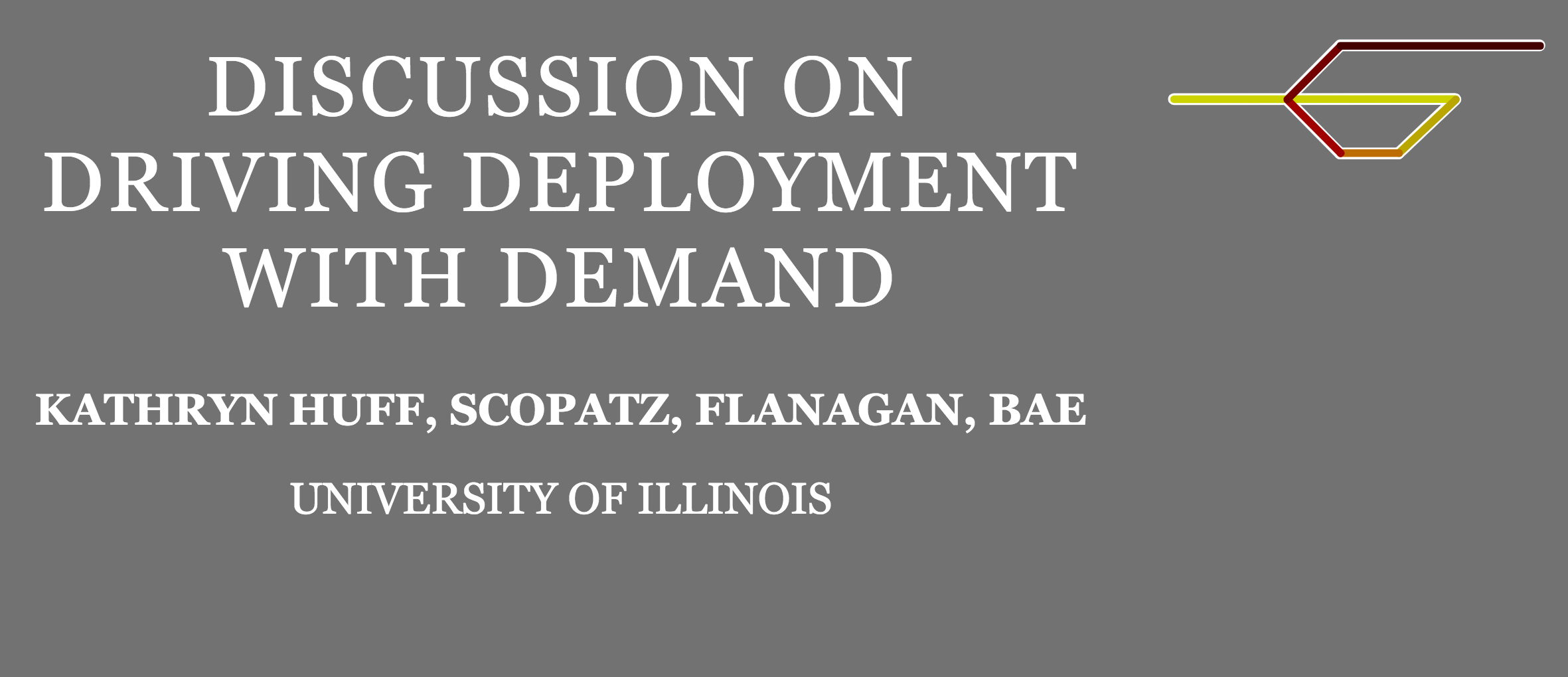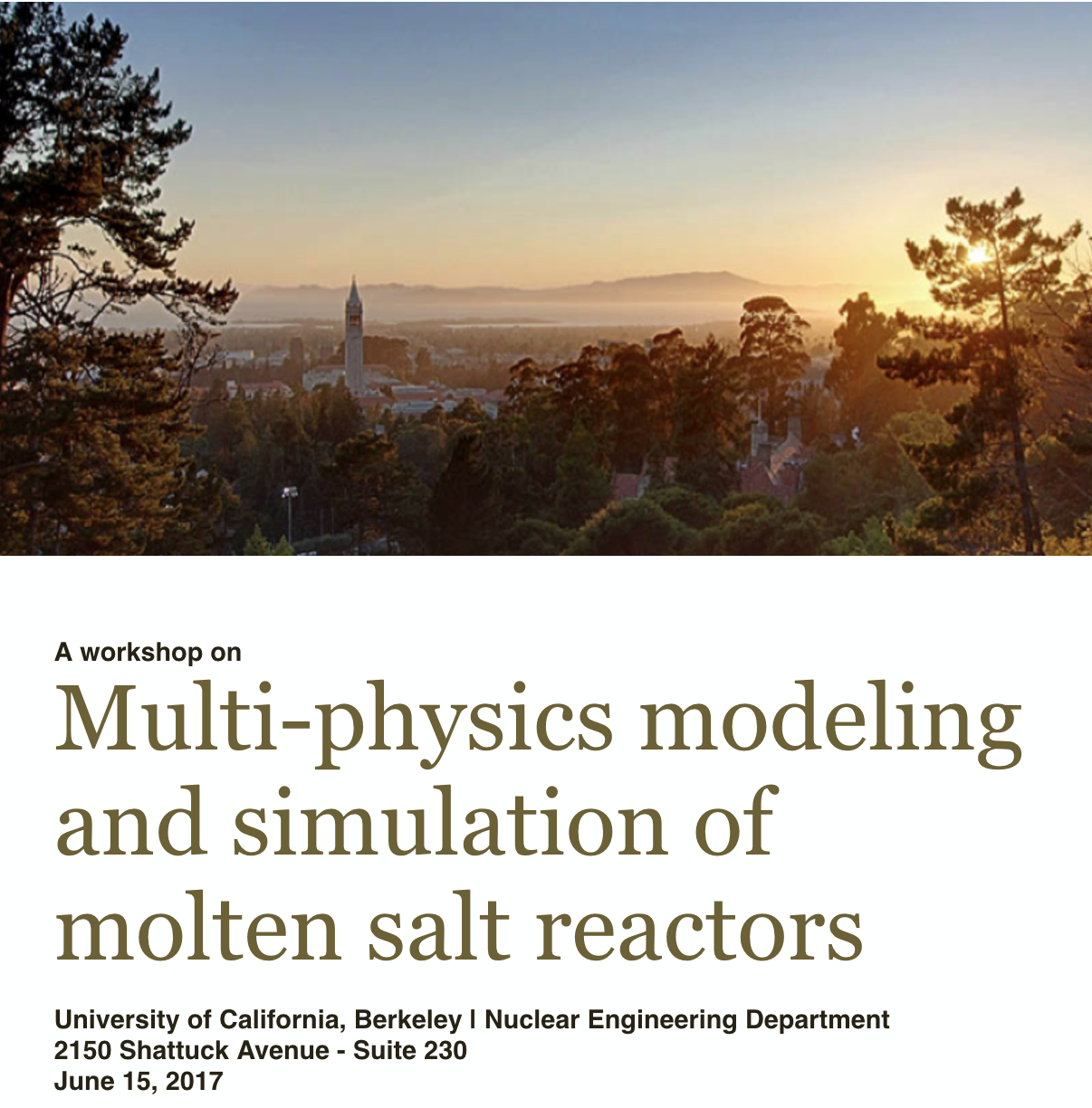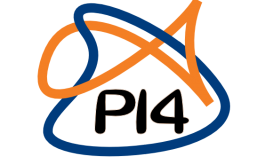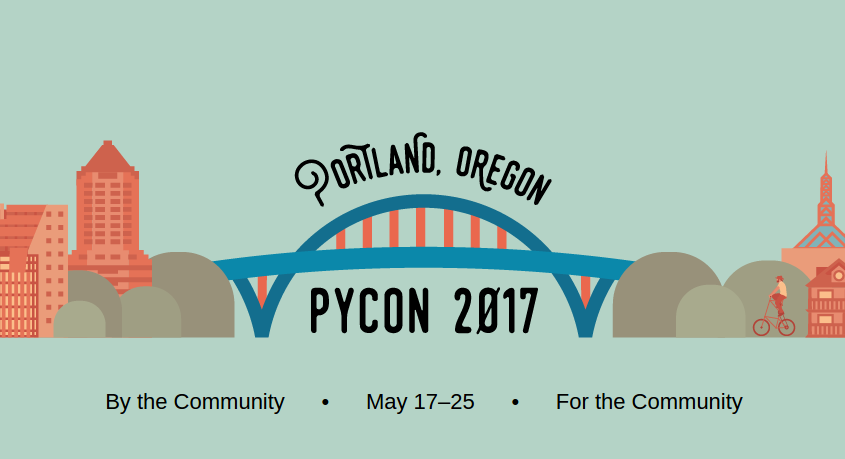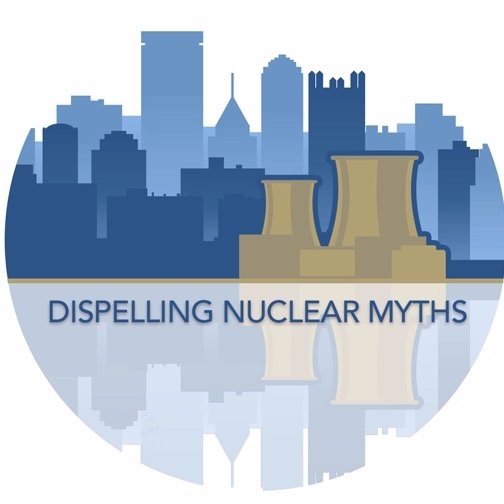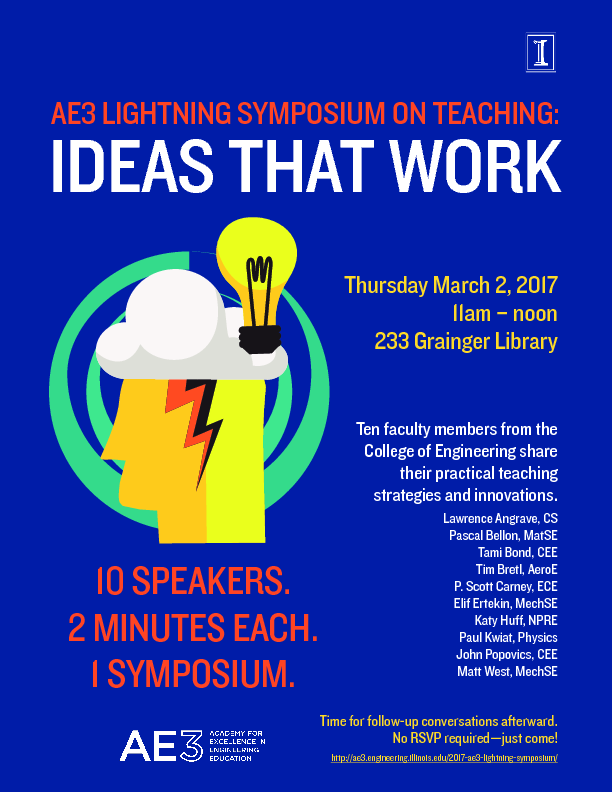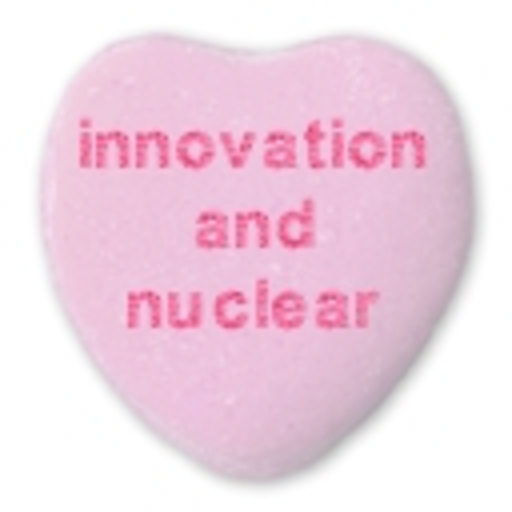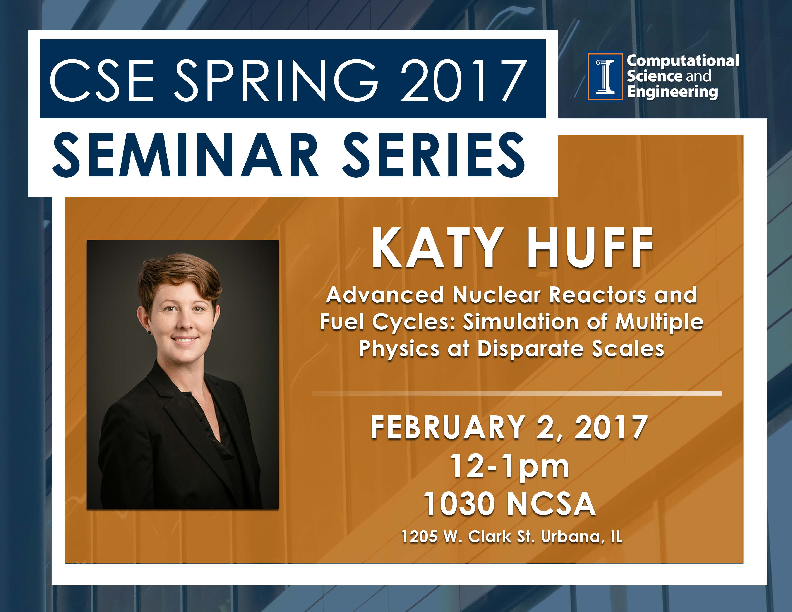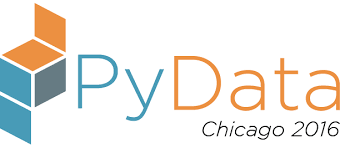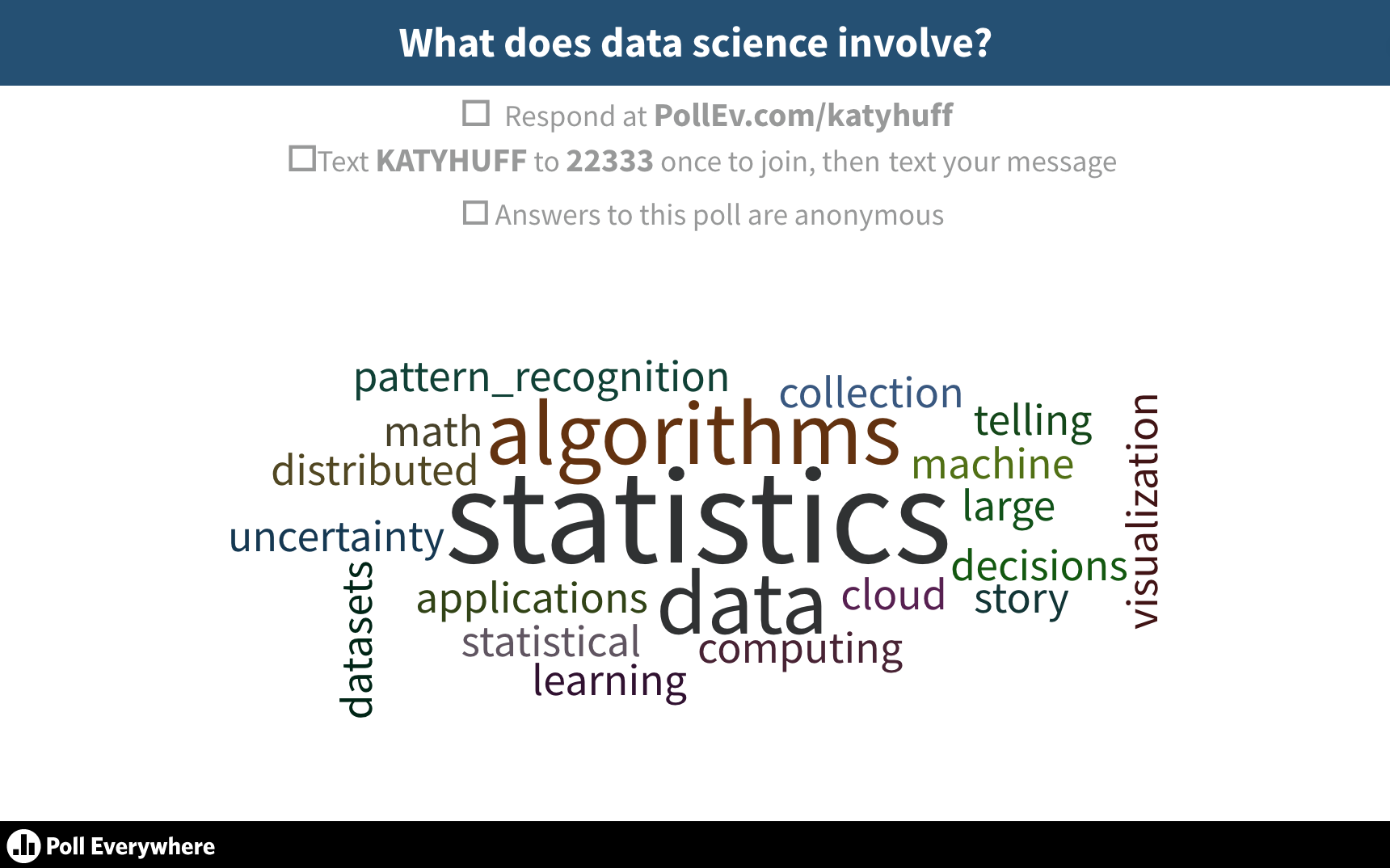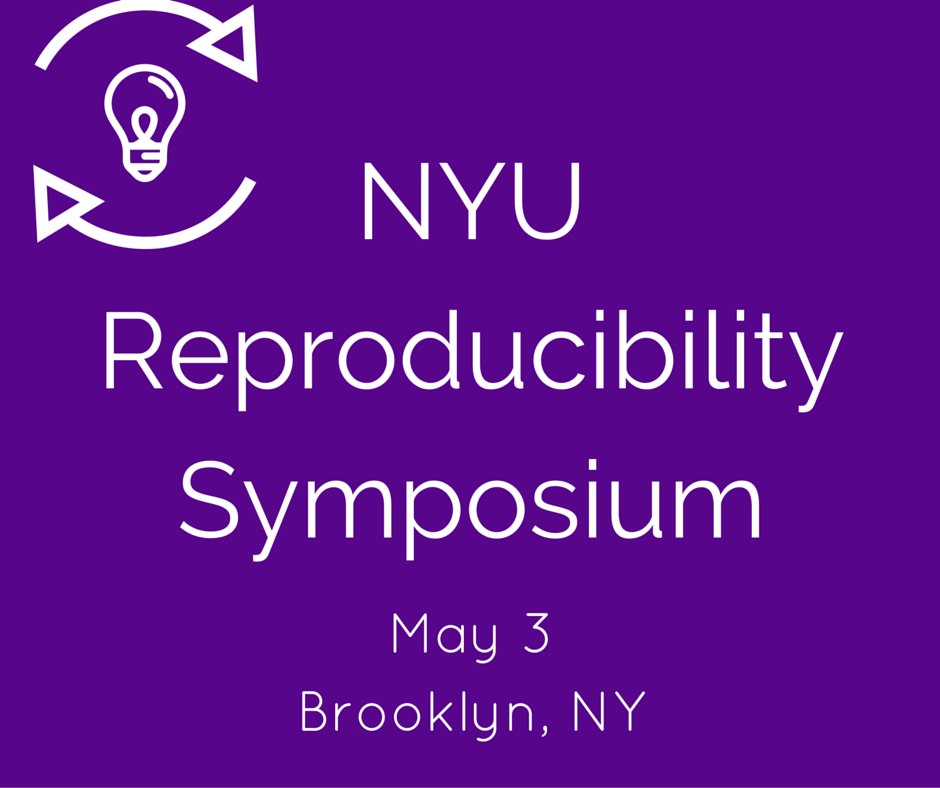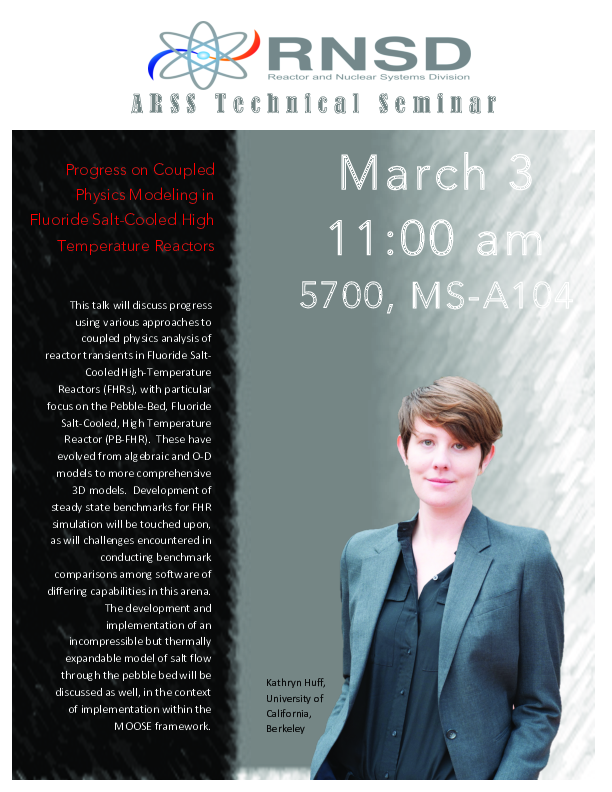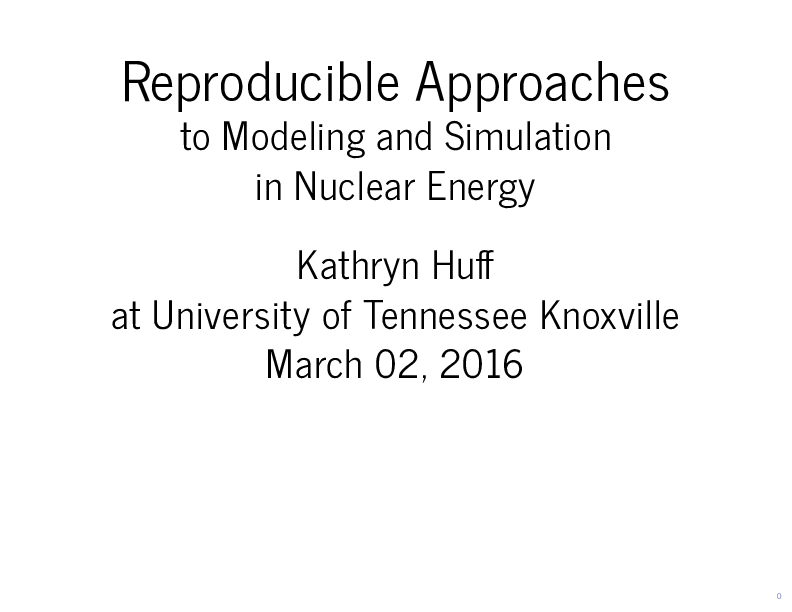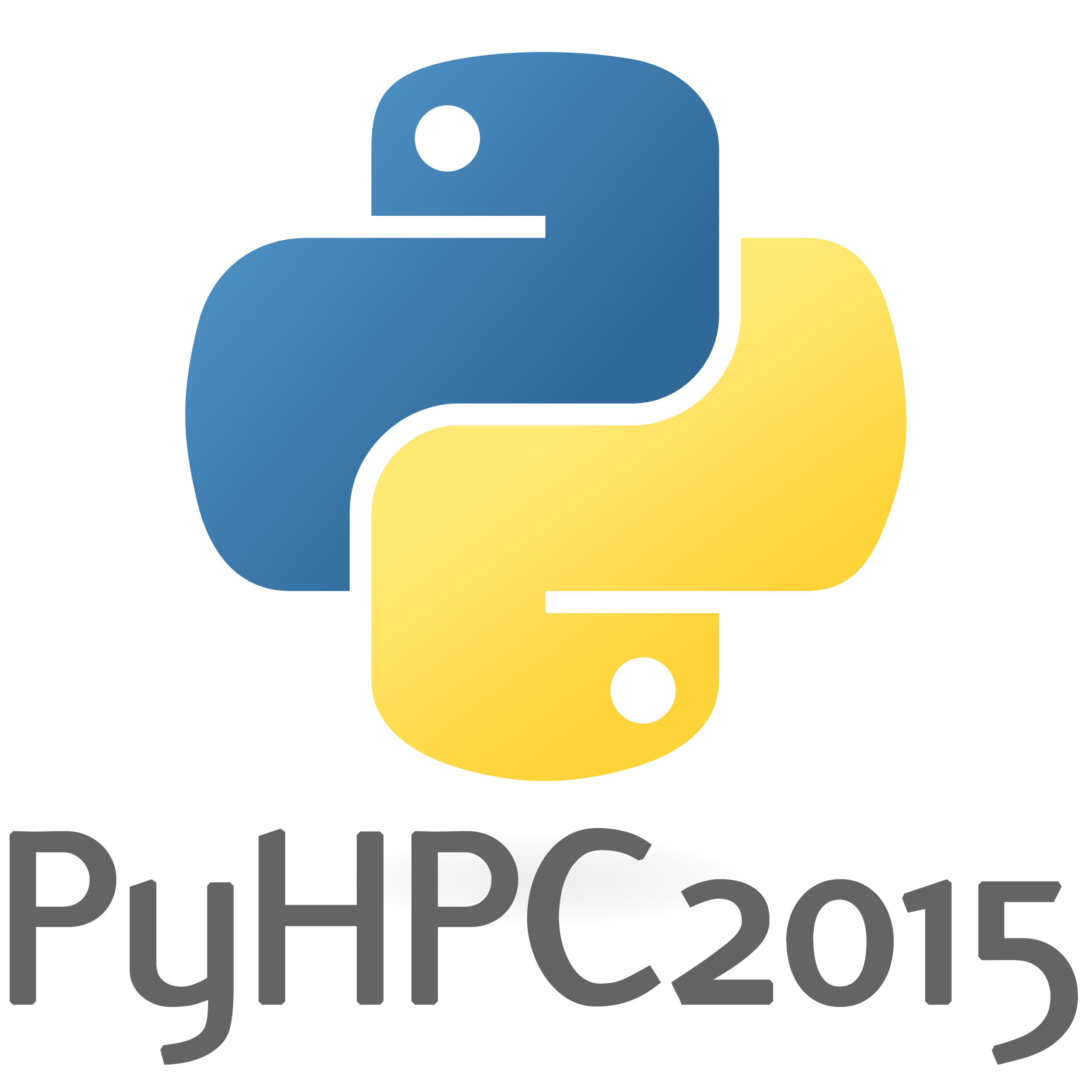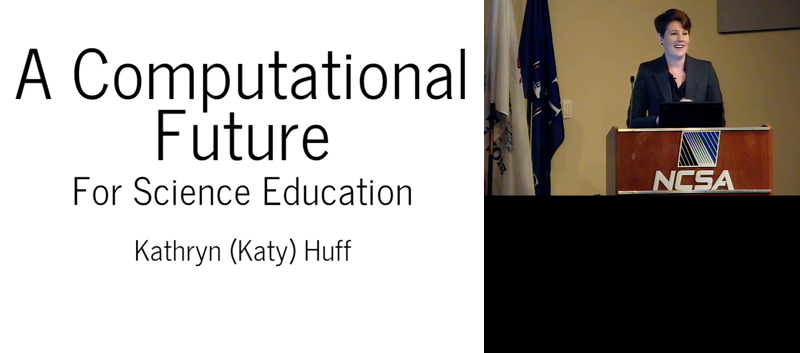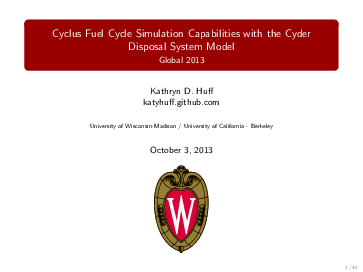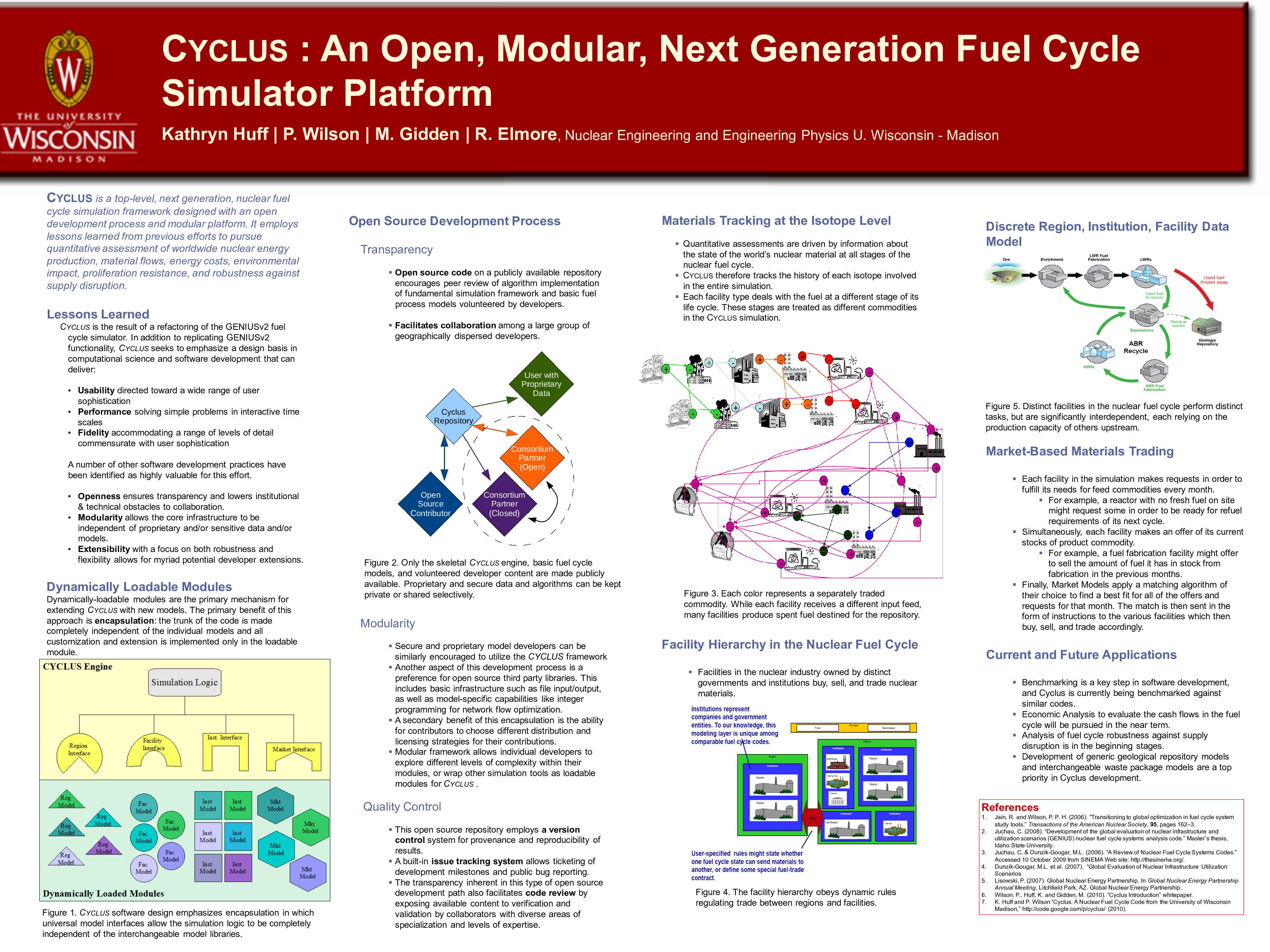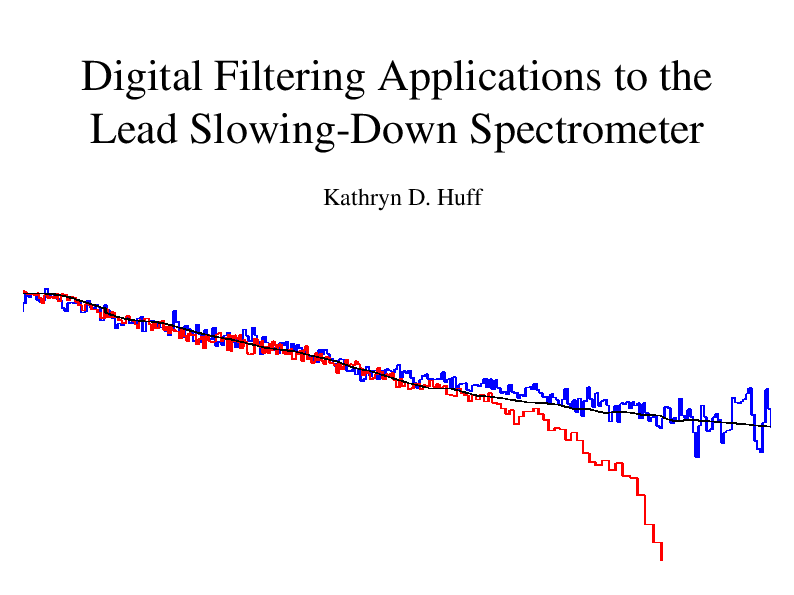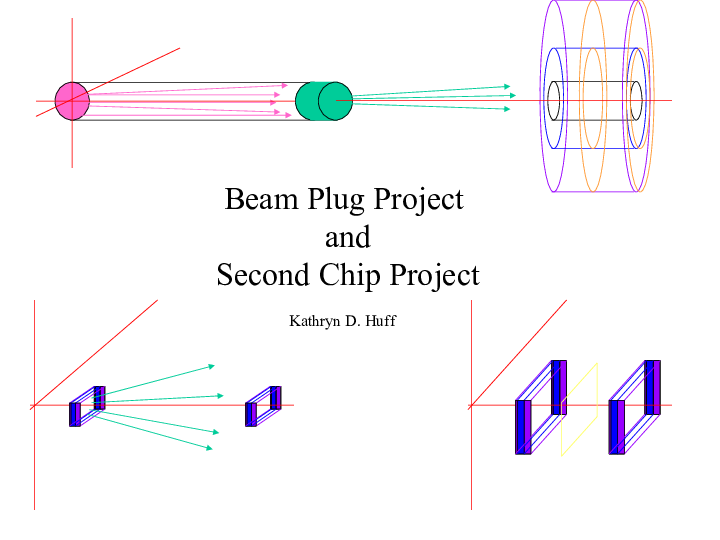Presentations
We give many presentations about our research and other activities. We try to make the presentation materials available whenever possible. You'll find links to most of our talks below.
July 10, 2025
Burning fuel for cheap! Transport-independent depletion in OpenMC
(SciPy 2025)
Oleksandr Yardas
Tacoma, WA
Technical Presentation
This presentation details a new method for running depletion simulations independently of neutron transport in OpenMC. Transport-independent depletion uses pre-computed static multigroup cross sections and fluxes to calculate reaction rates for OpenMC's depletion matrix solver. This accelerates the depletion calculation, but removes the spatial coupling between depletion and neutron transport. Using this method, concentration errors for low-abundance nuclides at longer (30-day) time steps exhibit large negative initial concentration the becomes more positive with time due to overestimation of nuclide production stemming from the lack of spatial coupling to neutron transport. For ten 3-day time steps, fission product concentration errors are all under 3%. Actinide concentration errors range from 10-15% for Am and Cm, 5-7% for Pu and Np, and 2% and less for U. Surprisingly, the numbers are similar for 30-day time steps. These results demonstrate the potential of this new method with moderate accuracy and extraordinary time savings for low and medium fidelity simulations. Concentration error characterization on larger models remains an open area of interest.
April 28, 2025
A Hybrid SN-Diffusion Method for Molten Salt Reactor Control Rod Modeling
International Conference on Mathematics and Computational Methods Applied to Nuclear Science and Engineering (M&C 2025)
Sun Myung Park
Denver, CO
Technical Presentation
This presentation presents a hybrid SN-diffusion method for accurate modeling of control rods in time-dependent molten salt reactor simulations. The hybrid method combines the strengths of both approaches by applying transport corrections generated using the SN method near control rods. 1-D simulation results show that the hybrid method provides improved rod worth estimates compared to pure diffusion models. The hybrid method iterative scheme demonstrates robustness in convergence and converges rapidly within two outer iterations.
April 14-16, 2022 at 3:00 pm
Useful practices in open-source software development for nuclear science and engineering
American Nuclear Society Student Conference
Oleksandr R. Yardas
Urbana, IL
Technical Presenation
/pres/2022-yardas-ans-student.pdf
Historically, software used in licensing, R&D, and E&T efforts in the nuclear field have been closed source and proprietary. For R&D and E&T efforts in particular, this can bring collaborative efforts to a grinding halt until regulatory bodies grant software licences. Using closed codes in scientific publications and research presents ethical issues with regards to ease of reproducibility and the ability of external verification of results. Regulatory bodies will require new software features (and in some cases entirely new software tools) in order to effectively and efficiently perform licensing activities for the next generation of advanced reactor designs. Many of the open source tools emerging in the past decade have the advantage over their legacy closed code ancestors of using best-practices for software development. It follows that these features and tools are more readily implementable in these new open source projects than in the legacy closed codes. This presentation discusses three tools developers new and old can use in ther development workflow.
May 31, 2022
Impacts of HALEU on the Nuclear Fuel Cycle
NC State University Building Future Faculty Program
Amanda M. Bachmann
Raleigh, NC
Invited Seminar
/pres/2022-03-31-bachmann-bff.pdf
Many new advanced reactor designs will require High-Assay Low Enriched Uranium (HALEU) for fuel, which will allow for longer cycle times and higher burnups. However, there is no commercial supplier of HALEU in the US right now, and there is an expected need for HALEU by the end of the decade. The need for HALEU will depend on a number of variables: the type of advanced reactor(s) deployed, the timeline on which they are deployed, the energy demand of the advanced reactor(s), and the fuel cycle option used. This work looks at the transition from the current fleet of Light Water Reactors to HALEU-fueled advanced reactors to understand the material requirements of the transition. The material requirements of interest include the number of reactors that are deployed, the mass of uranium supplied to reactors for fuel, and the Separative Work Units required to enrich the uranium.
June 28, 2021 at 4:30 pm
Modeling material requirements of the transition to HALEU fueled reactors
TWOFCS 2021
Amanda M. Bachmann
Online Virtual Meeting
Technical Presentation
/pres/2021-bachmann-twofcs.pdf
Some of the designs for advanced reactors will require High-Assay Low Enriched Uranium (HALEU), which is uranium at a higher enrichment level than the fuel for current Light Water Reactors. This presentation explores resource requirements for different transition scenarios to advanced reactors fueled by HALEU. This work is funded through an NEUP Fellowship.
June 16, 2021 at 1:15 pm
Comparing HALEU Demand Among Advanced Reactor Fuel Cycle Transitions
American Nuclear Society Annual Meeting 2021
Amanda M. Bachmann
Online Virtual Meeting
Technical Presentation
/pres/2021-bachmann-annual.pdf
Some of the designs for advanced reactors will require High-Assay Low Enriched Uranium (HALEU), which is uranium at a higher enrichment level than the fuel for current Light Water Reactors. This presentation explores resource requirements for different transition scenarios to advanced reactors fueled by HALEU. This work is funded through an NEUP Fellowship.
April 8-10, 2021
Enriched Uranium Supply Requirements for the Transition to Advanced Reactors
American Nuclear Society Student Conference
Amanda M. Bachmann
Online Virtual Meeting
Technical Presenation
/pres/2021-bachmann-ans-student.pdf
Some of the designs for advanced reactors will require High-Assay Low Enriched Uranium (HALEU), which requires a higher enrichment level than the fuel for current Light Water Reactors. This presentation explores resource requirements for the transition to advanced reactors fueled by HALEU. This work is funded through an NEUP Fellowship.
March 17, 2021 at 8:30 am
Multiphysics Modeling Using the MOOSE Framework
IAEA Workshop on Multiphysics Modeling to Optimize Design and Safety of Advanced Nuclear Reactors
Kathryn Huff
Online Virtual Meeting
International Workshop
/pres/2021-03-17-huff-iaea.pdf
The International Atomic Energy Agency has recently initiated a project on open source nuclear codes for reactor analysis (ONCORE). The IAEA aims to support and strengthen its Member States’ capabilities in the field of advanced reactors modelling and simulations, and is making use of ONCORE platform to support, coordinate, and collaborate in the development of open-source code for research and development and education and training purposes. Modelling and simulation of nuclear reactors with their complex geometry, and involvement of different physics and scales is one of the major challenges in the field. Development of new reactor designs also requires understanding of new and better approach to model them appropriately. This webinar aims to provide some insights into Multiphysics modelling of advanced nuclear reactors, their benefits, challenges and different approaches to develop these complex nuclear codes. This webinar is also part of the outreach effort to engage interested member states in the ONCORE initiative. The webinar is particularly useful for professionals and researchers in this field.
October 12, 2020 at 12:00 pm
The Future of Nuclear Energy
Rotary Club of Highland Park and Highwood
Samuel G. Dotson
Online Virtual Meeting
Outreach Presentation
/pres/2020-10-12-dotson-outreach.pdf
Nuclear energy has to the potential to promote peace by enabling the decommissioning of nuclear weapons and societies can leverage nuclear's zero emissions electricity to fully decarbonize their electric grids for a green future. Join Sam in a conversation about the future of nuclear energy.
June 10, 2020 at 4:20 pm
Optimal Sizing of a Micro-reactor on Embedded Grid Systems
American Nuclear Society Annual Meeting 2020
Samuel G. Dotson
Online Virtual Meeting
Technical Presentation
/pres/2020-06-10-dotson-ans2020.pdf
Micro-reactors offer a path to rapidly decarbonize embedded grids like the one at the University of Illinois at Urbana-Champaign. This talk discusses the role of a nuclear reactor on the UIUC campus as well as it's optimal size.
June 10, 2020 at 11:00 am
Hydrogen Economy in Champaign-Urbana, IL
American Nuclear Society Annual Meeting 2020
Roberto Fairhurst
Virtual Meeting
Technical Presentation
/pres/2020-06-10-fairhurst-ans.pdf
This talk presents an approach for decarbonizing transportation on UIUC campus.
June 9, 2020 at 1:30 pm
Single Channel Design Based on Artificial Intelligence for Molten Salt Reactors
American Nuclear Society Annual Meeting 2020
Mehmet Turkmen
Virtual Meeting
Technical Presentation
/pres/2020-06-09-turkmen-ans.pdf
This talk introduces a novel design recommendation approach based on machine learning methods in predicting performance metrics of nuclear reactor designs.
November 19, 2019 at 10:15 am
The Impact of Xenon-135 on a Load Following Transatomic Power Molten Salt Reactor
American Nuclear Society Winter Meeting 2019
Andrei Rykhlevskii
Washington, DC
Technical Presentation
/pres/2019-11-19-rykhlevskii-ans.pdf
This talk discusses the effect of Xe-135 poisoning for a Transatomic Power MSR and compares it with well-known PWR behavior.
September 26, 2019 at 9:15am
Safety Analysis of the Molten Salt Fast Reactor Fuel Composition with Moltres
Global 2019
Sun Myung Park
Seattle, WA
Technical Presentation
/pres/2019-09-26-park-global.pdf
This presentation discusses transient, coupled neutronics/thermal-hydraulics simulations of the MSFR using Moltres.
September 24, 2019 at 14:15 pm
Demand Driven Deployment Capabilities in Cyclus
Global 2019
Gwendolyn Chee
Seattle, WA
Technical Presentation
/pres/2019-09-24-ddca-global.pdf
This presentation demonstrates using demand driven deployment capabilities in Cyclus to set up transition scenarios.
August 25, 2019 at 3:30 pm
Fuel Cycle Performance of Fast Spectrum Molten Salt Reactor Designs
The International Conference on Mathematics and Computational Methods applied to Nuclear Science and Engineering (M&C 2019)
Andrei Rykhlevskii
Portland, OR
Technical Presentation
/pres/2019-08-26-rykhlevskii-mc.pdf
This presentation discusses progress in fuel cycle performance evaluation for four different fast molten salt reactors.
July 10, 2019 at 5:30 pm
Preventing Disaster: Identifying Nuclear Weapons with Neural Networks
SciPy 2019
Mark Kamuda
Austin, TX
Poster Presentation
/pres/2019-07-10-kamuda-scipy.pdf
This poster discusses how our trained machine learning algorithms perform when identifying shielded and unshielded enriched uranium gamma-ray spectra.
July 7, at 5:00 pm
Using Low-Resolution Gamma-ray Spectroscopy and Machine Learning as an Information Barrier for Uranium Enrichment Measurments
Consortium for Verification University Program Review, 2019
Mark Kamuda
Raleigh, NC
Poster Presentation
/pres/2019-07-04-kamuda-cvt.pdf
This poster discusses how a machine learning alogirthm can be trained to identify the U-235 enrichment of an object without human interaction.
June 28, 2019 at 10:00 am
Diversion Detection in Cyclus
TwoFCS 2019
Greg Westphal
Urbana, IL
Technical Presentation
/pres/2019-06-28-pyre-twofcs.pdf
This presentation discusses the work done towards detecting various methods of diversion from within a pyroprocessing plant, and is tested on a transition scenario.
June 26, 2019 at 09:45 am
Demand Driven Deployment Capabilities in Cyclus
TwoFCS 2019
Gwendolyn Chee
Urbana, IL
Technical Presentation
/pres/2019-06-26-ddca-twofcs.pdf
This presentation presents the demand driven deployment capabilities in Cyclus with simple transition scenarios examples.
February 27, 2019 at 11:00 am
Neutron Kinetics in Liquid-Fueled Nuclear Reactors
SIAM CSE: Computational Methods for Kinetic Models of Gases and Plasmas Minisymposium
Kathryn Huff
Spokane, WA
Invited Mini Symposium
Presentation in the MS187 Minisymposium: Statistical mechanics provides a mathematical modeling framework in which a collection of particles (e.g., electrons, nucleons, atoms, or molecules) is represented by a probability density function (PDF). This representation allows one to model the influence of microscopic dynamics on larger scales, without explicitly computing the detailed dynamics on the microscopic scale. Models in this framework are referred to as kinetic models, and arise in many application areas, including in rarefied gas dynamics, nuclear reactor modeling, and plasma physics. Transport phenomena refers to the evolution and redistribution of macroscopic quantities such as mass, momentum, energy, and heat flux. This minisymposium addresses recent advances in computational methods for the simulation of statistical mechanical models and the resulting transport phenomena. Our goal is to showcase a diverse array of application areas, models, and numerical techniques.
February 26, 2019 at 04:30 am
Sustaining Student Software
SIAM CSE: PP103 Minisymposterium: Software Productivity and Sustainability for CSE and Data Science
Kathryn Huff
Spokane, WA
Mini Symposterium
https://doi.org/10.6084/m9.figshare.7768349.v1
A university research group focused on CSE software development can generate an enormous amount of software very quickly. Not all of it can (or should) be sustained. A constantly increasing maintenance burden is unsustainable and the transient nature of student researchers further complicates software sustainability. However, computational research groups build their research capabilities by leveraging and sustaining software. This poster will summarize lessons learned and challenges encountered by an early career faculty member striking this balance. We will describe software life cycles in the context of the software development workflow, tool stack, and community strategies we use in the Advanced Reactors and Fuel Cycles group. This life cycle will touch on a number of topics, including: software birth/death/afterlife, the various roles of the PI, collaborative code review, skills training, best practices, responsible employment of undergraduates, contribution disambiguation, and contributor transitions.
February 26, 2019 at 03:30 am
Simulation of Molten Salt Reactors with Moltres
SIAM CSE: Multiphysics Simulation with MOOSE - Part II of II
Andrei Rykhlevskii
Spokane, WA
Mini Symposium
/pres/2019-02-26-rykhlevskii-siam.pdf
The Advanced Reactors and Fuel Cycles (ARFC) group models and simulates the design, safety, and performance of advanced nuclear reactors. For these simulations coupling between physics such as neutron transport, thermal-hydraulics phenomena, and fuel performance must be taken into account. Our group performs high fidelity simulation of Gen IV reactor designs through development of models and tools for representing unique materials, complex geometries, and physical phenomena. Current work introduces an extension of the MOOSE framework, Moltres, to appropriately model coupled thermal-hydraulics and neutronics of promising liquid-fueled Molten Salt Reactor designs. Initial simulations of the Molten Salt Reactor Experiment (MSRE) have been conducted on Blue Waters supercomputer with deterministic multiphysics. Steady state, transient, and fuel cycle analysis simulations have been run in 2D as well as 3D and compared against the Molten Salt Reactor Experiment. These simulations have occupied up to many hundreds of nodes simultaneously and have resulted in rich datasets for use in reactor design and analysis. This talk will describe how coupling between neutronics and thermal hydraulics have been established in the Moltres as well as the validation and verification efforts which have been completed.
February 20, 2019 at 03:30 am
Neutron Kinetics and Dynamics in Liquid-Fueled Nuclear Reactors
Seminar, School of Nuclear Engineering, Purdue University
Kathryn Huff
West Lafayette, IN
Invited Seminar
Modeling and simulation of neutron kinetics and dynamics in liquid-fueled, molten salt reactors incorporates three major challenging components. First, it is necessary to establish the dynamic evolution of fuel composition via depletion and online reprocessing. Additionally, multiphysics analysis of the thermal hydraulics and neutronics in such a nuclear reactor must incorporate thermal feedbacks and material expansion feedbacks. Finally, drift of delayed neutron precursors must be incorporated into the kinetics analysis due to the mobility of the liquid fuel. This talk will discuss all three components. Toward the first component, a discussion of the SaltProc python package will establish the fuel composition dynamics capabilities necessary for fuel composition depletion in the context of online reprocessing. Toward the second component, a point kinetics model implementation in PyRK, and a more sophisticated advection model implementation in Moltres will be discussed, including neutron diffusion and precursor drift equations in Moltres as well as their implementation using the MOOSE action system. Finally, future directions for Moltres and SaltProc development will be noted.
February 1, 2019 at 11:00 am
Dynamic transition analysis with TIMES
Energy Analysis Division Workshop, I2CNER Annual Symposium
Anshuman Chaube
Fukuoka, Japan
Workshop
/pres/2019-02-01-chaube-i2cner.pdf
Progress on the ARFC project to simulate dynamic transition scenarios in the Japanese electricity-generation sector aimed at lowering carbon emissions.
December 22, 2018 at 10:15 am
Best Practices and Resources for Scientific Computing
SciPy India
Kathryn Huff
Mumbai, Maharashtra, India
Keynote
https://katyhuff.github.io/2018-12-22-mumbai
This talk will touch on best practices approaches to building software and simulations for scientific computation. In addition to using and contributing to SciPy itself, This talk will touch on best practices approaches to building software and simulations for scientific computation. These include concepts covered in the paper 'Best Practices in Scientific Computing' (Wilson, et al) as well as concepts covered in 'Effective Computation in Physics' (Scopatz, Huff). It describes a set of practices that are easy to adopt and have proven effective in many research settings. None of these practices will guarantee efficient, error-free software development, but used in concert they will reduce the number of errors in scientific software, make it easier to reuse, and save the authors of the software time and effort that can use for focusing on the underlying scientific questions. This talk will also touch on pain points and lessons learned from a series of case studies of real scientists doing their best, recently published in 'The Practice of Reproducible Research' (Kitzes, Deniz, Turek editors).
December 18, 2018 at 12:20 am
Neutron Kinetics in Liquid-Fueled Nuclear Reactors
Indo-US Science and Technology Forum - Symposium on Advanced Sensors and Modelling Techniques for Nuclear Reactor Safety
Kathryn Huff
Mumbai, Maharashtra, India
Invited Speaker
Modeling and simulation of neutron kinetics in liquid-fueled nuclear reactors incorporates three major challenging components. First, it is necessary to establish the dynamic evolution of fuel composition via depletion and online reprocessing. Additionally, multiphysics analysis of the thermal hydraulics and neutronics in such a reactor must incorporate thermal feedbacks and material expansion feedbacks. Finally, drift of delayed neutron precursors must be incorporated into the kinetics analysis due to the mobility of the liquid fuel. This talk will discuss all three components. Toward the first component, a discussion of the SaltProc python package will establish the fuel composition dynamics capabilities necessary for fuel composition depletion in the context of online reprocessing. Toward the second component, a point kinetics model implementation in PyRK, and a more sophisticated advection model implementation in Moltres will be discussed. Finally, incorporation in Moltres of neutron diffusion and precursor equations will be discussed as will their implementation using the MOOSE action system. Abstract indexed at https://newprairiepress.org/asemot/2018/fullprogram/23/.
November 13, 2018 at 11:35 am
Impact of Composition Approximation on Simulated Nuclear Fuel Cycle Metrics
American Nuclear Society Winter Meeting 2018
Jin Whan Bae
Orlando, FL
Poster Presentation
/pres/2018-11-13-bae-answinter2018.pdf
This work compares the validity and limits of simplifying Used Nuclear Fuel (UNF) composition.
November 12, 2018 at 5:35 pm
Validation of Spent Nuclear Fuel Output by Cyclus, a Fuel Cycle Simulator Code
American Nuclear Society Winter Meeting 2018
Gwendolyn Chee
Orlando, FL
Technical Presentation
/pres/2018-11-12-chee-answinter2018.pdf
This presentation discusses the validation conducted of the isotopic compositions and decay heat contributions from the spent fuel produced by a Cyclus simulation of the historic United States nuclear fuel cycle.
November 12, 2018 at 4:00 pm
PyRe: A Cyclus Pyroprocessing Facility Archetype
Advances in Nuclear Nonproliferation Technology and Policy Conference 2018
Greg Westphal
Orlando, FL
Technical Presentation
/pres/2018-11-12-westphal-antpc2018.pdf
This presentation shows the progress made on modeling a pyroprocessing facility within the Cyclus framework and initial simulations.
November 08, 2018 at 1:00pm
Doing Our Best: Approaches in Scientific Computing
Insitute for Advanced Computational Science Seminar
Kathryn Huff
Stony Brook University
Seminar
https://katyhuff.github.io/2018-11-08-iacs
https://www.youtube.com/watch?v=YqTxZC1i-B0
This talk will touch on best practices approaches to building software and simulations for scientific computation. These include concepts covered in the paper 'Best Practices in Scientific Computing' (Wilson, et al) as well as concepts covered in 'Effective Computation in Physics' (Scopatz, Huff). It describes a set of practices that are easy to adopt and have proven effective in many research settings. None of these practices will guarantee efficient, error-free software development, but used in concert they will reduce the number of errors in scientific software, make it easier to reuse, and save the authors of the software time and effort that can use for focusing on the underlying scientific questions. This talk will also touch on pain points and lessons learned from a series of case studies of real scientists doing their best, recently published in 'The Practice of Reproducible Research' (Kitzes, Deniz, Turek editors).
October 31, 2018 at 4:00 pm
A Machine Learning Approach to Identifying Shielded Radioisotopes in Gamma-Ray Spectra
Consortium for Verification Technology Workshop
Mark Kamuda
Ann Arbor, MI
Poster Presentation
This poster compares dense and convolution neural networks for identifying shielded isotopes in gamma-ray spectra.
August 08, 2018 at 1:00 pm
Fuel Cycle Performance of Fast Spectrum Molten Salt Reactor Designs
ORNL NESLS Poster Session 2018
Andrei Rykhlevskii
Oak Ridge, TN
Poster Presentation
/pres/2018-08-08-fs_msrs_poster.pdf
This poster shows progress in fuel cycle performance evaluation for 4 different fast molten salt reactors.
June 13, 2018 at 9:30 am
A Comparison of Machine Learning Methods for Automated Gamma-ray Spectroscopy
Symposium on Radiation Measurements and Applications 2018
Mark Kamuda
Ann Arbor, MI
Poster Presentation
This poster outlines progress made comparing fully connected neural networks and convolution neural networks for isotope quantification in NaI gamma-ray spectra.
June 4, 2018 at 1:30 pm
Computational Tools for Advanced Molten Salt Reactors Simulation
Blue Waters Symposium 2018
Andrei Rykhlevskii
Sunriver, OR
Technical Presentation
/pres/2018-04-07-comp-tools-msr.pdf
https://www.youtube.com/watch?v=KWx_Jc1WU_I&t=8s
The Advanced Reactors and Fuel Cycles (ARFC) group models and simulates the design, safety, and performance of advanced nuclear reactors. Such reactors involve tight coupling between physics such as thermal-hydraulic phenomena, neutron transport, and fuel performance. Current work introduces an extension of the MOOSE framework, Moltres, to appropriately model coupled thermal-hydraulics and neutronics of promising molten-salt-fueled reactor designs. Additionally, we have developed an online reprocessing simulation tool, SaltProc which includes fission product removal, fissile material separations, and refuelling for time dependent analysis of fuel-salt evolution. Initial simulations of the Molten Salt Reactor Experiment and the conceptual Molten Salt Breeder Reactor have been conducted on Blue Waters with deterministic multiphysics and Monte Carlo methods respectively. Steady state, transient, and fuel cycle analysis simulations have been run in 2D as well as 3D and compared against the Molten Salt Reactor Experiment. Fuel cycle dynamics and quasi-equilibrium compositions were obtained from depletion and reprocessing simulations for a 20-year time frame. The MSBR full-core safety analysis was performed at the startup and equilibrium fuel salt compositions, for important reactor safety parameters. In this work, conducted on Blue Waters, ARFC has demonstrated the capability to model complex physics in an advanced molten-salt-fueled nuclear reactor.
April 20, 2018 at 2:00 pm
Open Source Curriculum Development
Academy for Excellence in Engineering Education: 2018 Celebration of Teaching
Kathryn Huff
Urbana, IL
Poster Presentation
This poster was presented on April 20, 2018 at the Academy for Excellence in Engineering Education (AE3) Celebration of Teaching at the University of Illinois. It describes the progress on the Open Source Curriculum Development SIIP. Kathryn Huff, Neal Davis, Paul Wilson, Robert Borrelli, Steven Skutnik, Jeremy Roberts, Anthony Scopatz. SIIP Liason: Jenny Amos.
April 10, 2018 at 4:00 pm
Advanced Online Reprocessing Simulation of Thorium-Fueled Molten Salt Breeder Reactor
NPRE596: Seminar in Nuclear Science and Engineering
Andrei Rykhlevskii
Urbana, IL
Technical Presentation
Current interest in advanced nuclear energy and Molten Salt Reactor (MSR) concept has enhanced demand in building the tools to analyze these systems. A Python script SaltProc has been developed to simulate MSR online reprocessing by modeling the changing isotopic composition of an irradiated fuel salt using Monte Carlo code SERPENT 2 for neutron transport and depletion calculations. This presentation introduces SaltProc code and first simulation results for Molten Salt Breeder Reactor (MSBR).
April 7, 2018 at 4:10 pm
Numerical Experiments for Testing Demand-Driven Deployment Algorithms
American Nuclear Society Student Conference 2018
Gwendolyn Chee
Gainesville, FL
Technical Presentation
/pres/2018-04-07-chee-stuconf.pdf
This presentation discusses the numerical experiments used to test demand driven deployment algorithms designed for Cyclus. This work is funded by Demand Driven Cycamore Archetypes NEUP proposal.
April 7, 2018 at 3:30 pm
Simulating the Spent Fuel Recipe of a Sodium-Cooled Fast Reactor
American Nuclear Society Student Conference 2018
Louis Kissinger
Gainesville, FL
Technical Presentation
/pres/2018-04-16_kissinger-stuconf.pdf
This presentation discusses the a depletion calculation conducted by Louis Kissinger in an independent study project with Prof. Huff. This work focused on the SFR-UAM benchmark core and evaluated a depleted fuel recipe for the core.
February 24, 2018 at 1:00 pm
Doing Our Best
Hack Illinois
Kathryn Huff
Urbana, IL
Keynote
https://katyhuff.github.io/2018-02-24-hackillinois
This talk will touch on best practices approaches to building software and simulations for scientific computation. These include concepts covered in the paper 'Best Practices in Scientific Computing' (Wilson, et al) as well as concepts covered in 'Effective Computation in Physics' (Scopatz, Huff). It describes a set of practices that are easy to adopt and have proven effective in many research settings. None of these practices will guarantee efficient, error-free software development, but used in concert they will reduce the number of errors in scientific software, make it easier to reuse, and save the authors of the software time and effort that can used for focusing on the underlying scientific questions. This talk will also touch on pain points and lessons learned from a series of case studies of real scientists doing their best, recently published in 'The Practice of Reproducible Research' (Kitzes, Deniz, Turek editors).
February 16, 2018 at 4:00 pm
Modeling and Simulation at Disparate Scales: Molten Salt Reactor Multiphysics and International Fuel Cycle Transitions
NERS Colloquium
Kathryn Huff
Ann Arbor, MI
Invited Seminar
https://katyhuff.github.io/2018-02-16-ners
The world's energy future depends on improved safety and sustainability of nuclear reactor designs and fuel cycle strategies. Insights can be drawn from numerical experiments that model and simulate these systems. Both reactor and nuclear fuel cycle dynamics are sufficiently complex that sophisticated scientific software methods and high-performance computing resources are essential to understanding them. Furthermore, improved reproducibility and verification in these numerical experiments can be achieved through judicious use of scientific computing best practices. Using examples drawn from spent nuclear fuel management and advanced reactor design, this talk will describe the role and benefits of modeling and simulation combining insights from multiple scales in nuclear engineering challenges. The talk will introduce Moltres, a new physics application for multiphysics modeling of liquid-fueled molten salt reactors. The neutronics model, thermal hydraulics model, and their coupling in the MOOSE framework will be described. Results for many-channel configurations in 2D-axisymmetric and 3D coordinates will be presented and compared against other coupled models as well as the Molten Salt Reactor Experiment. This talk will also touch on isotope identification with neural networks and recent transition analyses using Cyclus, an agent-based nuclear fuel cycle simulation framework.
February 15, 2018 at 6:00 pm
Doing Our Best: Practices in Open, Reproducible Scientific Computing
PyData Ann Arbor
Kathryn Huff
Ann Arbor, MI
Invited Tech. Talk
https://katyhuff.github.io/2018-02-15-pydata
This talk will touch on best practices approaches to building software and simulations for scientific computation. These include concepts covered in the paper 'Best Practices in Scientific Computing' (Wilson, et al) as well as concepts covered in 'Effective Computation in Physics' (Scopatz, Huff). It describes a set of practices that are easy to adopt and have proven effective in many research settings. None of these practices will guarantee efficient, error-free software development, but used in concert they will reduce the number of errors in scientific software, make it easier to reuse, and save the authors of the software time and effort that can used for focusing on the underlying scientific questions. This talk will also touch on pain points and lessons learned from a series of case studies of real scientists doing their best, recently published in 'The Practice of Reproducible Research' (Kitzes, Deniz, Turek editors).
February 8, 2018 at 8:50 am
Signatures and Observables Thrust Area Summary
Consortium for Nonproliferation Enabling Capabilities Annual Workshop
Kathryn Huff
Raleigh, NC
Podium Presentation
This presentation gives an overview of the research taking place in the Signatures and Observables thrust area within the Consortium for Nonproliferation Enabling Capabilities.
February 8, 2018 at 12:30 pm
Signatures and Observables in the Nuclear Fuel Cycle
Consortium for Nonproliferation Enabling Capabilities Annual Workshop
Gregory Westphal
Raleigh, NC
Poster Presentation
This presentation gives an overview of the research planned for collaboration with the Consortium for Nonproliferation Enabling Capabilities.
January 31, 2018 at 12:30 pm
Dynamic Transition Analysis with TIMES
i2cner Annual Symposium
Kathryn Huff
Fukuoka, Japan
Poster Presentation
This presentation gives an overview of the research planned for collaboration with the Energy Analysis Division of the International Institute for Carbon-Neutral Energy Research.
December 8, 2017 at 3:30 pm
Machine Learning for Acceleration of Monte Carlo Transport
SPIN Lightning Talks
Xin Wen
Urbana, IL
Lightning Talk
This presentation gives an overview of the research conducted so far toward machine learning acceleration of monte carlo transport.
November 29, 2017 at 2:15 pm
Uranium Enrichment Measurements Using an Artificial Neural Network
Consortium for Verification Technology Workshop
Mark Kamuda
Ann Arbor, MI
Technical Presentation
A report on progress toward uranium enrichment isotope identification with Artificial Neural Networks.
November 16, 2017 at 3:30 pm
Advanced Reactors and Fuel Cycles Group
NPRE 100: Introduction to NPRE
Kathryn Huff
Urbana, IL
Guest Lecture
https://katyhuff.github.io/2017-11-16-npre100
This presentation gives an overview of the research group appropriate for undergraduates in NPRE
October 31, 2017 at 3:30 pm
Synergistic Spent Nuclear Fuel Dynamics Within the European Union
American Nuclear Society Winter Meeting 2017
Jin Whan Bae
Washington, DC
Technical Presentation
/pres/2017-10-31-synergistic.pdf
This presentation was presented by Jin Whan Bae, on a collaborative approach to reprocess used nuclear fuel from other EU nations for France to transition into a closed fuel cycle without the additional construction of LWRs.
October 31, 2017 at 1:55 pm
Full-Core Analysis of Thorium-Fueled Molten Salt Breeder Reactor Using the SERPENT 2 Monte Carlo Code
American Nuclear Society Winter Meeting 2017
Andrei Rykhlevskii
Washington, DC
Technical Presentation
/pres/2017-10-31-full-core.pdf
This talk introduces recently developed full-core 3-D high-fidelity model of Molten Salt Breeder Reactor (MSBR) for SERPENT 2 Monte Carlo code. Effective multiplication factor, neutron energy spectrum and temperature coefficients were determined in steady state criticality simulation and then compared against J. Park (MCNP6) model and Oak Ridge National Laboratory technical report.
October 31, 2017 at 12:30 pm
Why Nuclear?
Olin College Lunch Seminar
Kathryn Huff
Needham, MA
Invited AMA
http://katyhuff.github.io/2017-10-31-olin
Nuclear fission is a safe, reliable, efficient, emissions-free source of plentiful energy. It must accordingly play an essential role in a carbon-reduced sustainable future for our planet. However, it is also somewhat curious, contentious, and complex. This discussion will begin with a brief explanation of the basic physics behind nuclear fission power systems, a synopsis of current and advanced reactor types, and some compelling facts. The remaining majority of the hour will be devoted to an open, ask-me-anything discussion which will thrive on your curiosity, concerns, confusions, and creativity. FAQ include: What about the waste? Can we recycle it? What about meltdowns? Can a reactor become a bomb? Where does plutonium come from? Is radiation natural? Is thorium magic? When will fusion happen?
October 30, 2017 at 2:55 pm
Online Reprocessing Simulation for Thorium-Fueled Molten Salt Breeder Reactor
American Nuclear Society Winter Meeting 2017
Andrei Rykhlevskii
Washington, DC
Technical Presentation
This work describes online reprocessing modeling approach of Molten Salt Breeder Reactor (MSBR). MSBR unit cell online reprocessing simulation was performed using the SERPENT 2 Monte Carlo code to find equilibrium fuel composition. The neutron energy spectrum for initial and equilibrium composition was calculated. The approach will be using for full-core 3-D model of the reactor and fuel cycle parameters optimization.
October 31, 2017 at 11:00 am
An Intro to Moltres, an MSR Multiphysics Code
American Nuclear Society Winter Meeting 2017
Gavin Ridley
Washington, DC
Poster Presentation
This poster was presented by Gavin Ridley, who spent summer 2017 at UIUC with the ARFC group. It gives an introduction to the Moltres application, a MOOSE-based code for multiphysics simulation of molten salt reactors which was developed primarily by ARFC postdoctoral scholar, Alexander Lindsay.
September 27, 2017 at 4:00pm
Nuclear Power
Engineering 471: Seminar on Energy and Sustainability Engineering
Kathryn Huff
Urbana, IL
Invited Guest Lecture
This presentation covers some key topics regarding nuclear power, particularly in the context of economics and policy.
September 21, 2017 at 10:00am
Spent Nuclear Fuel Options
Nuclear Nonproliferation Seminar Reactor Course
Kathryn Huff
Urbana, IL
Invited Seminar
https://github.com/katyhuff/2017-09-21-anl
This presentation covers some key topics regarding nuclear spent fuel options, particularly in the context of nonproliferation.
September 20, 2017 at 8:30am
Techniques and Tools for Software Engineering
Blue Waters Graduate Fellows Symposium
Kathryn Huff
Urbana, IL
Technical Presentation
https://katyhuff.github.io/2017-09-20-ncsa
This presentation was presented by Kathryn Huff, but was the collective work of Kathryn Huff, Anthony Scopatz, Jin Whan Bae, and Robert Flanagan. It seeks to stimulate discussion about algorithms for driving deployment based on demand (not just of power, but of fuel materials, reprocessing capacity, etc) in each of the existing simulators. This discussion is tightly in line with the Demand Driven Cycamore Archetypes NEUP proposal.
July 19, 2017 at 10:00am
Driving Deployment with Demand
Technical Workshop on Fuel Cycle Simulation
Kathryn Huff
Columbia, SC
Technical Presentation
This presentation was presented by Kathryn Huff, but was the collective work of Kathryn Huff, Anthony Scopatz, Jin Whan Bae, and Robert Flanagan. It seeks to stimulate discussion about algorithms for driving deployment based on demand (not just of power, but of fuel materials, reprocessing capacity, etc) in each of the existing simulators. This discussion is tightly in line with the Demand Driven Cycamore Archetypes NEUP proposal.
July 12, 2017 at 9:15am
Academic Open Source
SciPy
Kathryn Huff
Austin, TX
Keynote
http://katyhuff.github.io/2017-07-12-scipy
https://www.youtube.com/watch?v=Nqzvnqg4OJ8
Academia, in particular academic science, has a great deal to learn and gain from its harmony with open source. Similarly, open source communities increasingly find themselves responsible for education. This talk will touch on the past, present, and possible future of the rich, delicate symbiosis between academia and open source.
July 6, 2017 at 3:00pm
Best Practices in Computational Nuclear Engineering
Reactor and Nuclear Systems Division
Kathryn Huff
Oak Ridge National Laboratory
Seminar
https://katyhuff.github.io/2017-07-06-ornl
The world's energy future depends on improved safety and sustainability of nuclear energy. Insights can be drawn from numerical experiments that model and simulate nuclear energy systems, but computational nuclear engineering is sufficiently complex that sophisticated scientific software methods, high-performance computing resources, and data analysis algorithms are essential. Furthermore, improved reproducibility and verification in these numerical experiments can be achieved only through judicious use of scientific computing best practices. This talk will touch on best practices approaches to building software and simulations for computational nuclear engineering. These include concepts covered in the paper 'Best Practices in Scientific Computing' (Wilson, et al) as well as concepts covered in 'Effective Computation in Physics' (Scopatz, Huff). It describes a set of practices that are easy to adopt and have proven effective in many research settings. None of these practices will guarantee efficient, error-free software development, but used in concert they will reduce the number of errors in scientific software, make it easier to reuse, and save the authors of the software time and effort that can used for focusing on the underlying scientific questions.
June 15, 2017 at 9:00am
Workshop on Multi-physics modeling and simulation of molten salt reactors
Alexander Lindsay
Berkeley, CA
Technical Presentation
/img/pres/2017-06-15-msr-pres.pdf
This work introduces Moltres, a new physics application for multiphysics modeling of fluid-fuelled molten salt reactors. The neutronics model, thermal hydraulics model, and their coupling in the MOOSE framework are described. Neutron and precursor equations are implemented using an Action system that allows use of an arbitrary number of groups with no change in the input card. Results for many-channel configurations in 2D-axisymmetric and 3D coordinates are presented. These are compared against other coupled models as well as the Molten Salt Reactor Experiment.
May 31, 2017 at 12:00 noon
Best Practices in Scientific Computing
2017 PI4 Computational Bootcamp
Kathryn Huff
Urbana, IL
Guest Speaker
http://katyhuff.github.io/2017-05-31-pi4
This talk covers a set of concepts covered in the paper 'Best Practices in Scientific Computing' (Wilson, et al) as well as concepts covered in 'Effective Computation in Physics' (Scopatz, Huff). It describes a set of practices that are easy to adopt and have proven effective in many research settings. Our recommendations are based on several decades of collective experience both building scientific software and teaching computing to scientists, reports from many other groups, guidelines for commercial and open source software development, and on empirical studies of scientific computing and software development in general. None of these practices will guarantee efficient, error-free software development, but used in concert they will reduce the number of errors in scientific software, make it easier to reuse, and save the authors of the software time and effort that can used for focusing on the underlying scientific questions.
May 20, 2017 at 9:40am
Do it For Science
PyCon
Kathryn Huff
Portland, OR
Keynote
http://katyhuff.github.io/2017-05-20-pycon
https://www.youtube.com/watch?v=kaGS4YXwciQ
In this talk, I seek to inspire open source python programmers to leverage their considerable skills and will toward scientific research software.
April 20, 2017 at 4:00pm
Modeling and Simulation of Advanced Reactors and Fuel Cycles
UC Davis Mechanical and Aerospace Engineering Seminar
Kathryn Huff
Davis, CA
Invited Seminar
http://katyhuff.github.io/2017-04-20-davis
https://www.youtube.com/watch?v=YqTxZC1i-B0#t=6m28s
Nuclear power provides the majority of our nation's safe, reliable, carbon free energy. Advanced nuclear reactors and nuclear fuel cycles promise to further improve passive safety, fuel utilization, and environmental impacts of this key energy source. This seminar will discuss open, reproducible, computational approaches to modeling and simulation of the multiple coupled physics and scales inherent to these systems. Approaches will include (1) agent based modeling of future energy growth, reprocessing, and fuel management scenarios, (2) the interplay between probabilistic and deterministic neutron transport methods for design and safety analysis, and (3) development of reactor physics kernels for the MOOSE (multiphysics object oriented simulation environment) framework.
April 12, 2017 at 5:15pm
Benefits of Siting a Borehole Repository at a Non-Operating Nuclear Facility
International High-Level Radioactive Waste Meeting 2017
Jin Whan Bae
Charlotte, NC
Research Paper Presentation
/pres/2017-benefits-ihlrwm.pdf
This work evaluates a potential solution for two pressing matters in the viability of nuclear energy: spent fuel disposal and power plants that no longer operate. The potential benefits of siting a borehole repository at a shut down nuclear power plant facility are analyzed from the perspective of myriad stakeholders. This assessment indicates that integrated siting will make economic use of the shut down power plant, take advantage of spent fuel handling infrastructure at those sites, minimize transportation costs, expedite emptying the crowded spent fuel storage pools accross the country, and will do so at sites more likely to have consenting communities.
April 7, 2017 at 3:00pm
Benefits of Siting a Borehole Repository at a Non-Operating Nuclear Facility
American Nuclear Society Student Conference 2017
Jin Whan Bae
Pittsburgh, PA
Research Paper Presentation
/pres/2017-benefits-ihlrwm.pdf
This work evaluates a potential solution for two pressing matters in the viability of nuclear energy: spent fuel disposal and power plants that no longer operate. The potential benefits of siting a borehole repository at a shut down nuclear power plant facility are analyzed from the perspective of myriad stakeholders. This assessment indicates that integrated siting will make economic use of the shut down power plant, take advantage of spent fuel handling infrastructure at those sites, minimize transportation costs, expedite emptying the crowded spent fuel storage pools accross the country, and will do so at sites more likely to have consenting communities.
March 2, 2017 at 11:00am
Reduce Classroom Bias with a Random Name Picker
AE3 Lightning Symposium
Kathryn Huff
233 Grainger Library, Urbana, IL
Invited Lightning Talk
To reduce implicit bias in the classroom, I use a random name picker. It's working.
February 14, 2017 at 12:00pm
Innovation and Nuclear Energy: A Love Story
Nuclear, Plasma, and Radiological Engineering Undergraduate Seminar Series
Kathryn Huff
Talbot Laboratory, Urbana, IL
Invited Seminar
http://katyhuff.github.io/2017-02-14-npre
This seminar will relate the epic 70-year romance between nuclear reactor design and nuclear reactor reality. It will recite the origins of the steamy long-term relationship between oxide fuel and light water, but will also shed light on both star-crossed and promising pairings between novel fuels, coolants, and moderators. Many strange sagas set in the Idaho desert will be told: tragic tales of youthful experiments (SL-1), hopeful meet-cutes (MSRE), and doomed couplings (ARE). The unique poetry of so-called 'paper reactors' will be touched upon, as will a tantalizing tale of promise: advanced nuclear reactors in the 21st century.
In all seriousness, this talk will discuss the history of advanced nuclear reactor design successes, failures, and possibilities from the 1940s to tomorrow. Nuclear power provides the majority of our nation's safe, reliable, carbon free energy. Advanced nuclear reactors and nuclear fuel cycles promise to further improve passive safety, fuel utilization, and environmental impacts of this key energy source. This talk gives a Valentine's-Day-themed history of those innovative advanced nuclear reactor designs as well as an overview of advanced reactor technologies today.
February 2, 2017 at 12:00pm
Advanced Nuclear Reactors and Fuel Cycles: Simulation of Multiple Physics at Disparate Scales
Computational Science and Engineering Seminar Series
Kathryn Huff
1030 National Center for Supercomputing Applications, Urbana, IL
Invited Seminar
http://katyhuff.github.io/2017-02-02-cse
https://www.youtube.com/watch?v=fWlUW_CFo3M
Nuclear power provides the majority of our nation's safe, reliable, carbon free energy. Advanced nuclear reactors and nuclear fuel cycles promise to further improve passive safety, fuel utilization, and environmental impacts of this key energy source. This seminar will discuss computational approaches to modeling and simulation of the multiple coupled physics and scales inherent to these systems. Approaches will include (1) agent based modeling of future energy growth, reprocessing, and fuel management scenarios, (2) the interplay between probabilistic and deterministic neutron transport methods for design and safety analysis, and (3) development of reactor physics kernels for the MOOSE (multiphysics object oriented simulation environment) framework.
Additionally, to appropriately distress this audience, this talk will touch on the origin, evaluation, processing, and validation of data in nuclear engineering. In particular, it will highlight the challenges presented by the variability of cross section data, the nuclear structure they attempt to capture, and real simulation accuracy concerns related to compensating errors within current evaluated nuclear data sets.
January 27, 2017 at 2:50pm
Lessons Learned
The Practice of Reproducible Research: Case Studies and Lessons from the Data-Intensive Sciences
Kathryn Huff
Sutardja Dai Hall, Banato Auditorium, University of California, Berkeley
Invited Lightning Talk
http://katyhuff.github.io/2017-01-27-bids
https://www.youtube.com/watch?v=w0NvZh44stg&t=45m24s
This symposium will serve as the launch event for our new open, online book, titled The Practice of Reproducible Research. The book contains a collection of 31 case studies in reproducible research practices written by scientists and engineers working in the data-intensive sciences. Each case study presents the specific approach that the author used to achieve reproducibility in a real-world research project, including a discussion of the overall project workflow, major challenges, and key tools and practices used to increase the reproducibility of the research. This lightning talk will focus on the Lessons Learned synthesis chapter.
The book launch event is described in full, here.
October 13, 2016 at 4:00pm
Data In Nuclear Engineering
Informatics 500 Seminar
Kathryn Huff
Urbana, IL
Invited Guest Lecture
http://katyhuff.github.io/2016-10-13-info500
This talk gave an overview of the origin, evaluation, processing, and validation of data in nuclear engineering. In particular, it highlighted the variability of cross section data, the nuclear structure they attempt to capture, and real concerns related to compensating errors within current evaluated nuclear data sets. This draws on a talk by Morgan C. White concerning what he terms 'the data dilemma.'
August 27, 2016
Human Learning at Scale
PyData Conference
Kathryn Huff
Chicago, IL
Invited Keynote
http://katyhuff.github.io/2016-08-27-pydata
https://www.youtube.com/watch?v=6yvr-tznCJ0
Today's researchers and future researchers are in great need of a new kind of curriculum, but delivering that curriculum at scale is a mounting challenge. I'll discuss how a data-intensive computational world calls for data-intensive computational education at every level (including children, high-schoolers, college students, researchers, emeritus professors). This talk will touch on how my understanding of this need is informed by my own experience as well as work conducted with the Moore-Sloan Reproducibility and Open Science Working Groups at UW, NYU, and UCB. This talk will touch on attempts at many scales to meet the challenge at hand. These will include both failed and successful efforts by myself, my colleagues, organizations such as The Hacker Within and Software Carpentry, and it will also touch on the important contributions of the open source python community. Finally, I'll share a glimpse of my newest and most real challenges inserting data intensive computational workflows into traditional engineering curriculum.
June 19, 2016
Engineering Academic Software
Engineering Academic Software Dagstuhl Perspectives Workshop
Kathryn Huff
Schloss-Dagstuhl, GERMANY
Invited Participant
http://katyhuff.github.io/2016-06-19-dagstuhl/
Software is at the heart of modern academic science, but our institutions for education and research are undergoing growing pains concerning the proper care and feeding of software and software developers in the context of academia. Conducting open, reproducible, computational science in the domains involves many practical challenges. Leading a software-development-focused research group in academia can be difficult to fund and manage with traditional strategies. Similarly, programs for training students in the domain sciences to become effective computational researchers are rare, immature, untested, or untennable. Research leaders are also faced with challenges in software sustainability and are unprepared to develop the user-developer communities needed to sustain and improve their software in their scientific domain. Finally, efforts to improve the quality of scientific software through top-down pressure are hampered by publication venues (journals, etc.) hesitant to adopt and uphold stricter software quality requirements. Software Carpentry, Lab Carpentry, The Hacker Within, and other initiatives are currently lowering the barriers for academics who produce software as part of their research work. However, more effort is needed to support a new generation of computationally fluent research teams.
May 27, 2016 at 11:00am
BIDS: Berkeley Institute for Data Science
Nuclear Data Science Workshop - Sorma West
Kathryn Huff
University of California, Berkeley, CA
Lightning Talk
http://katyhuff.github.io/2016-05-27-sorma
A discussion of the various eductional activities at the Berkeley Institute for Data Science and at Berkeley more generally
May 3, 2016
Reproducibility Initiatives at the Berkeley Institute for Data Science
NYU Reproducibility Symposium
Kathryn Huff
Brooklyn, NY
Invited Keynote
http://bids.github.io/2016-05-03-nyu
In parallel with the Moore-Sloan Data Science Environments at UW and NYU, the Berkeley Institute for Data Science (BIDS) has a working group focused on Reproducibility and Open Science. This working group has hosted workshops, horizon scans, tutorials, and seminars at Berkeley to encourage discussion, identify needs, and assist scientists with adopting available reproducibility tools. We are engaged in numerous projects related to these efforts. One is the development of a book of "reproducible case studies" that we collected from scientists across institutions and scientific disciplines. Each case study is a collection of a researcher’s summary of their most reproducible workflow, their insights about the tools used, the distinct stages of the workflow, the difficulties encountered while making the project more reproducible or replicable, and finally, any noteworthy benefits realized from the use of specific tools or research strategies. The book is intended to be a resource for scientists seeking to learn about potential best practices and processes that they might use toward reproducibility in their own work. This talk will review what we discovered through this process, including insights about researcher workflows, pain points, incentives, and human challenges.
March 3, 2016 at 11:00am
Progress on Coupled Physics Modeling in Fluoride Salt Cooled High Temperature Reactors
Reactor and Nuclear Systems Division
Kathryn Huff
Oak Ridge National Laboratory
Seminar
https://katyhuff.github.io/2016-03-03-ornl
This talk will discuss progress using various approaches to coupled physics analysis of reactor transients in Fluoride Salt Cooled High Temperature Reactors (FHRs), with particular focus on the Pebble-Bed, Fluoride Salt Cooled, High Temperature Reactor (PB-FHR). These have evolved from algebraic and 0-D models to more comprehensive 3D models. Development of steady state benchmarks for FHR simulation will be touched upon, as will challenges encountered in conducting benchmark comparisons among software of differing capabilities in this arena. The development and implementation of an incompressible but thermally expandable model of salt flow through the pebble bed will be discussed as well, in the context of implementation within the MOOSE framework.
March 2, 2016 at 1:30-2:30pm
Reproducible Approaches to Modeling and Simulation in Nuclear Energy
Nuclear Engineering Department Colloquium
Kathryn Huff
University of Tennesee, Knoxville
Invited
https://katyhuff.github.io/2016-03-02-utk
The world's energy future depends on improved safety and sustainability of nuclear reactor designs and fuel cycle strategies. Insights can be drawn from numerical experiments that model and simulate these systems. Both reactor and nuclear fuel cycle dynamics are sufficiently complex that sophisticated scientific software methods, high-performance computing resources, and data analysis algorithms are essential to improving our understanding of them. Furthermore, improved reproducibility and verification in these numerical experiments can be achieved through judicious use of scientific computing best practices. This talk will touch on best practices approaches to building software and simulations for coupled physics analysis of reactor transients in the Pebble-Bed, Fluoride Salt Cooled, High Temperature Reactor (PB-FHR) as well as Cyclus, the agent-based nuclear fuel cycle simulation framework.
November 15, 2015 at 2:00pm
A Pythonic Future for Science Education
Supercomputing Conference, Workshop on Python For High Performance Computing
Kathryn Huff
Austin, TX
Keynote
http://katyhuff.github.io/2015-11-15-pyhpc
Detailed computational models, massively parallelized calculations, and enormously collaborative simulation projects are increasingly integral to the advancement of science. However, the caliber of this work is limited by a workforce lacking formal training in essential software development skills. To address this unmet need, a number of initiatives (e.g. Software Carpentry, Data Carpentry) have developed online resources and led short courses addressing software development best practices such as version control and test driven code development, as well as basic skills such as UNIX mobility. With the exception of the Software Carpentry Drivers License for High Performance Computing, however, these initiatives stop just shy of parallelization concepts and skills, and their scalability and sustainability is further limited by the volunteer power on which they run. The challenge at hand will only be sustainably solved when best practices in research-grade scientific computing have penetrated the traditional science and engineering curriculum in universities. This talk will describe a new effort to embed best practices for reproducible, application-focused, research-grade scientific computing into traditional university curriculum. In particular, a set of open source, liberally licensed, IPython (now Jupyter) notebooks are being developed and tested to accompany a book “Effective Computation in Physics: A Field Guide to Research in Python.” These interactive lecture materials lay out in-class exercises for a project-driven university course and are accordingly intended to be forked, modified and reused by professors across universities and disciplines. With Python as a teaching language, this course prepares university students for research at scale by approaching practical scientific computing challenges such as data structures, performant simulation design, hierarchical data storage, parallelization, analysis, and visualization.
November 6, 2015 at 11:00am
A Computational Future For Science Education
National Center for Supercomputing Applications
Kathryn Huff
University of Illinois, Urbana, IL
Colloquium
http://katyhuff.github.io/2015-11-06-ncsa/
https://www.youtube.com/watch?v=jYET0KJbNRU
Detailed computational models, massively parallelized calculations, and enormously collaborative simulation projects are increasingly integral to the advancement of science. However, the caliber of this work is limited by a workforce lacking formal training in a reproducible, transparent, software development skill suite that is becoming increasingly essential. To address this unmet need, a number of initiatives (e.g. Software Carpentry, Data Carpentry, and The Hacker Within) have developed online resources, led short courses, and nurtured local communities addressing software development best practices such as version control and test driven code development, as well as basic skills such as UNIX mobility. In addition to unique contributions such as a Drivers License for High Performance Computing, Software Carpentry conducts workshops at research institutions around the world. These workshops seek to provide time efficient introductions to essential programming languages and tools without turning “biochemists and mechanical engineers into computer scientists”. The Hacker Within similarly nurtures a peer-driven community for scientific computing skill sharing. It does so through regular meetings in a few local chapters around the world, including one at the University of Illinois. The scalability and sustainability of these initiatives, however, is limited by the volunteer power on which they run, so their challenge will only be sustainably solved when best practices in scientific computing have penetrated the traditional science and engineering curriculum in universities. This talk will describe one new effort to embed best practices for reproducible scientific computing into traditional university curriculum. In particular, a set of open source, liberally licensed, IPython (now Jupyter) notebooks are being developed and tested to accompany a book “Effective Computation in Physics.” These interactive lecture materials lay out in-class exercises for a project-driven upper-level undergraduate course and are accordingly intended to be forked, modified and reused by professors across universities and disciplines.
October 3, 2013
Cyclus Fuel Cycle Simulation Capabilities with the Cyder Disposal System Model
American Nuclear Society Conference
Kathryn Huff
Salt Lake City, UT
Conference Presentation
/pres/huff_cyclus_2013_pres.pdf
Presentation concerning the Cyder disposal system model built for the Cyclus tool.
March 1, 2011
Cyclus: An Open, Modular, Next Generation Fuel Cycle Simulator Platform
Waste Management Symposium
Kathryn Huff
Phoenix, AZ
Poster
/pres/huff_cyclus_2011_pres.pdf
poster concerning Cyclus open next generation fuel cycle simulator.
June 2008
Consolidated Fuel Treatment Center and Advanced Burner Reactor
University of Chicago Big Problems Energy Analysis Course
Kathryn Huff
Chicago, IL
Seminar
/pres/biris_consolidated_2008.pdf
August 2004
Digital Filtering Applications to the Lead Slowing Down Spectrometer
Los Alamos Neutron Science Center (LANSCE-3)
Kathryn Huff
Los Alamos, NM
REU Summer Seminar
/img/pres/huff_digital_2004_pres.png
Digital filtration application to the signal from the LSDS at LANSCE-3.
August 2003
Beam Plug Project and Second Chip Project
Los Alamos Neutron Science Center (LANSCE-3)
Kathryn Huff
Los Alamos, NM
REU Summer Seminar
A project concerning the necessary size of beam plug in the fictional scenario of an uncontrollable accelerator at LANSCE.
